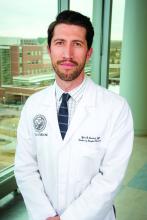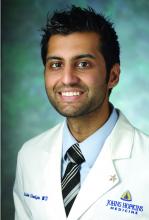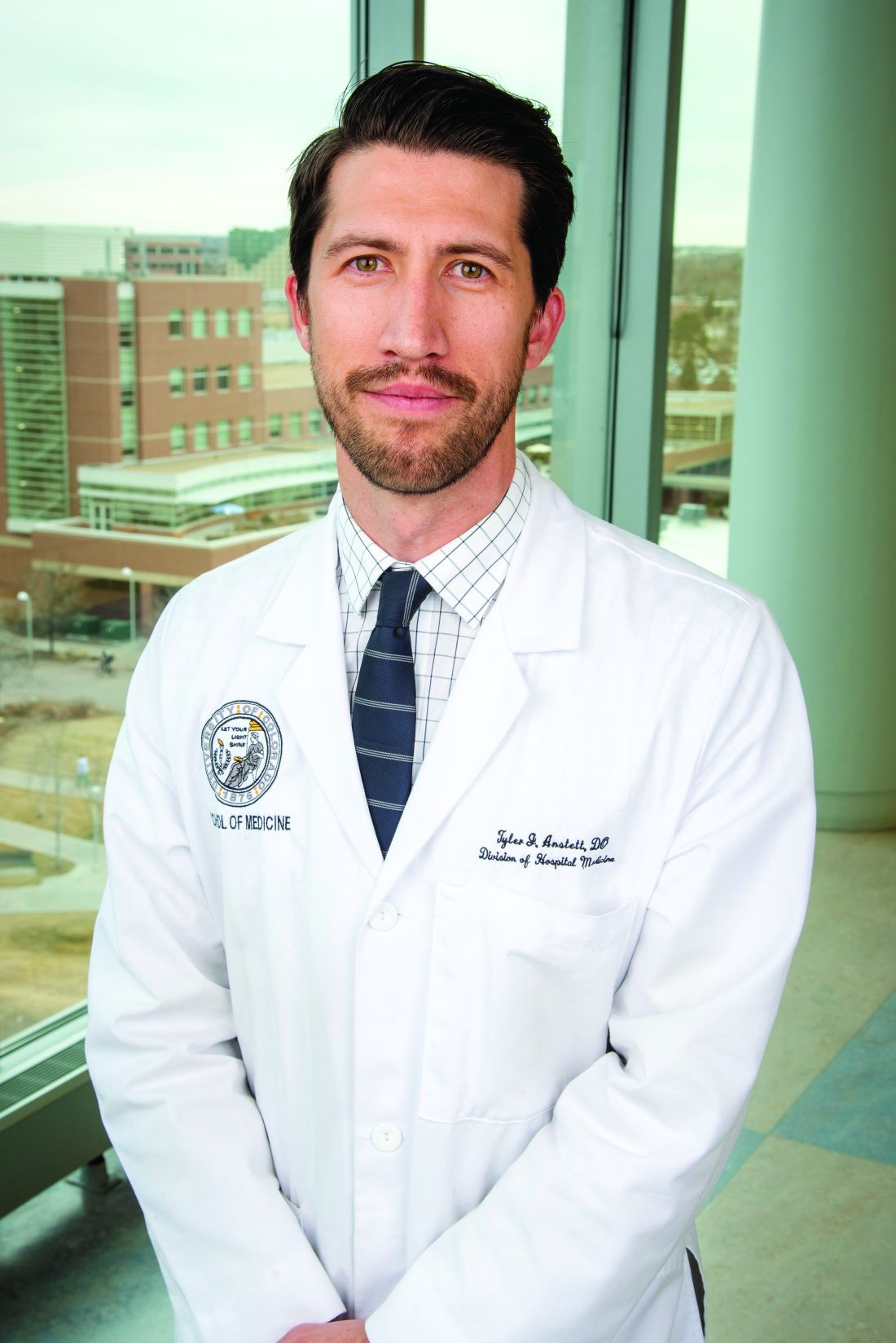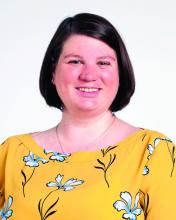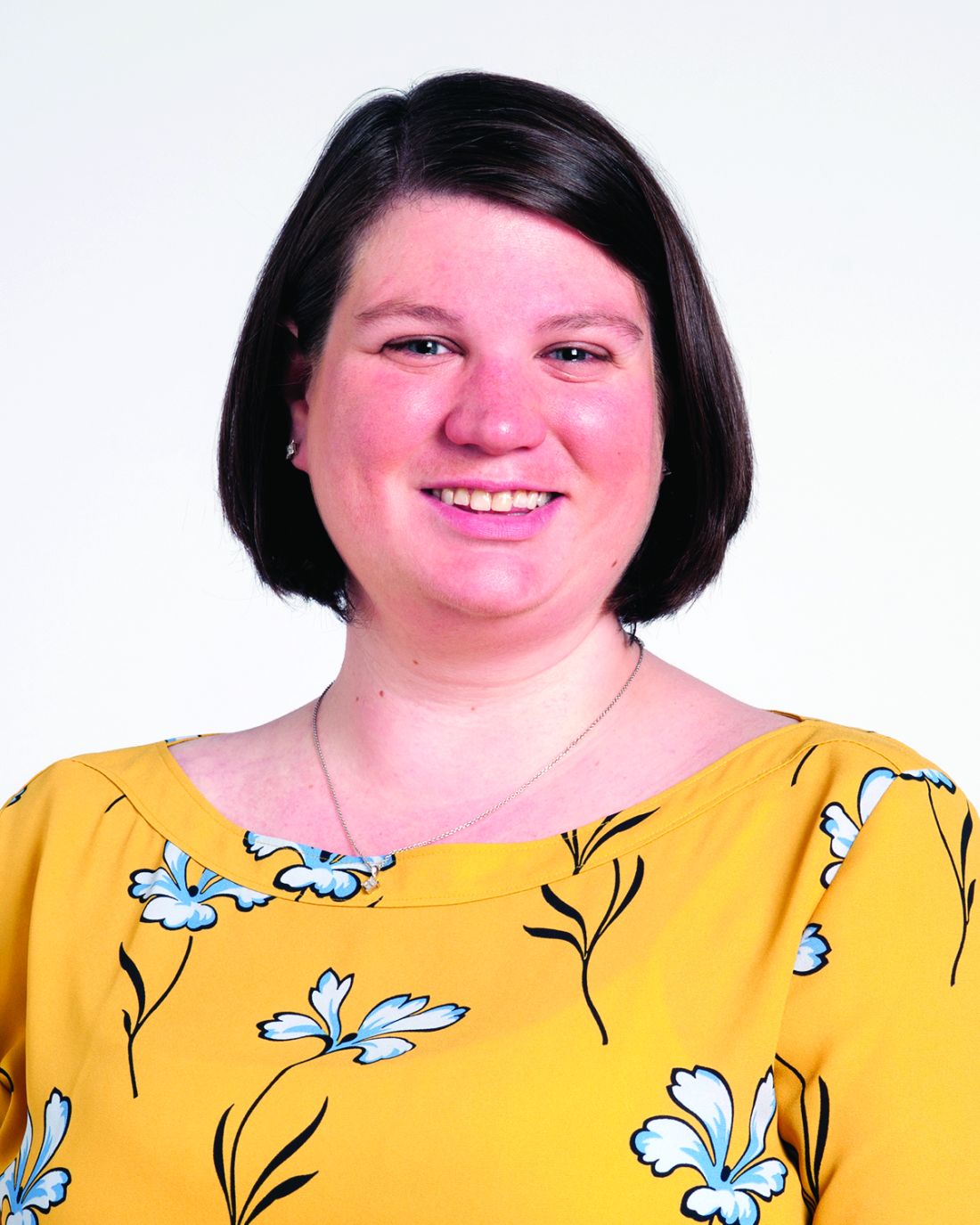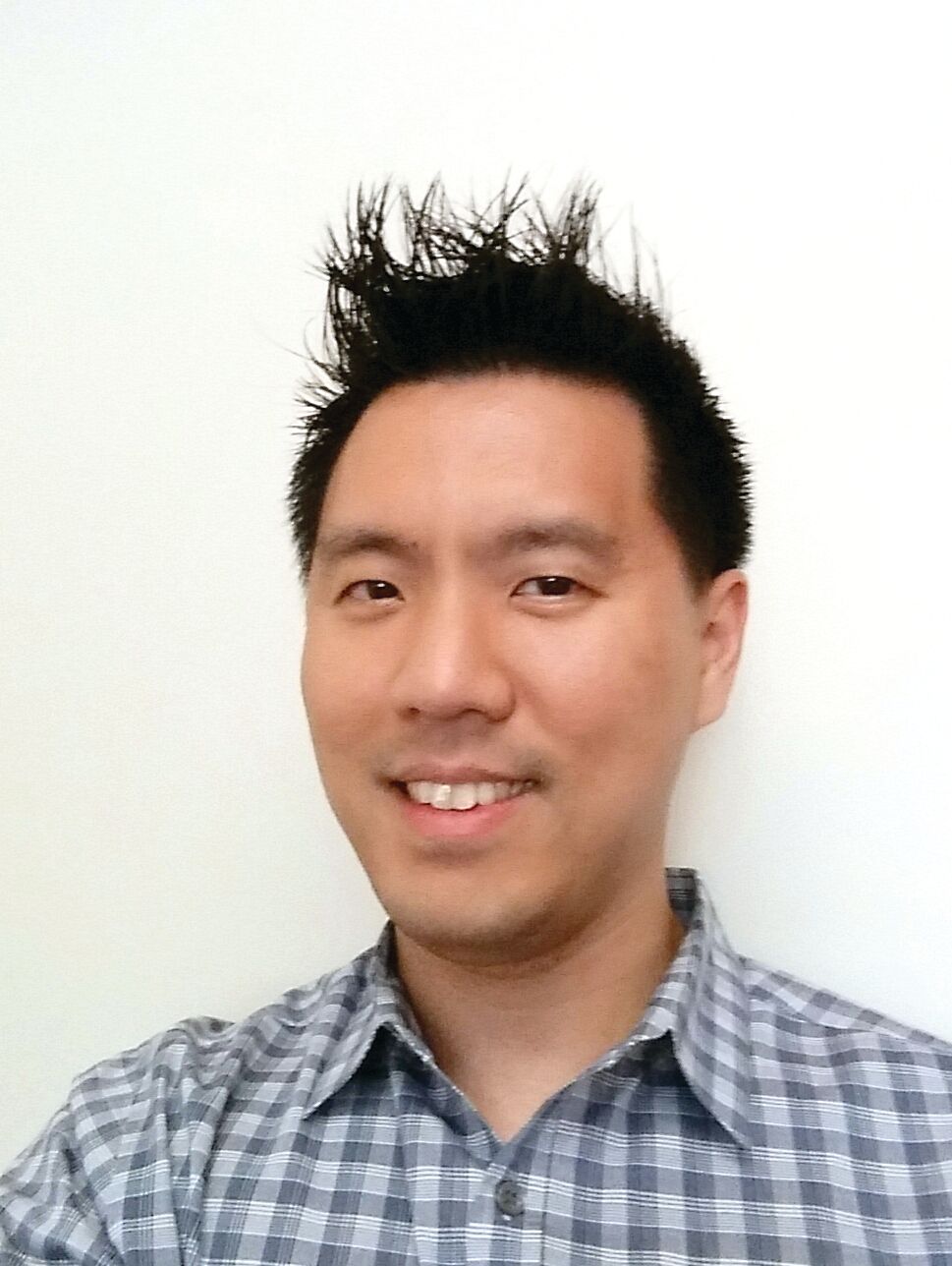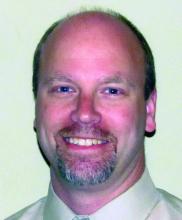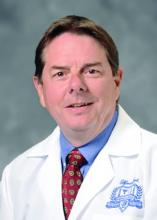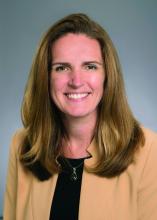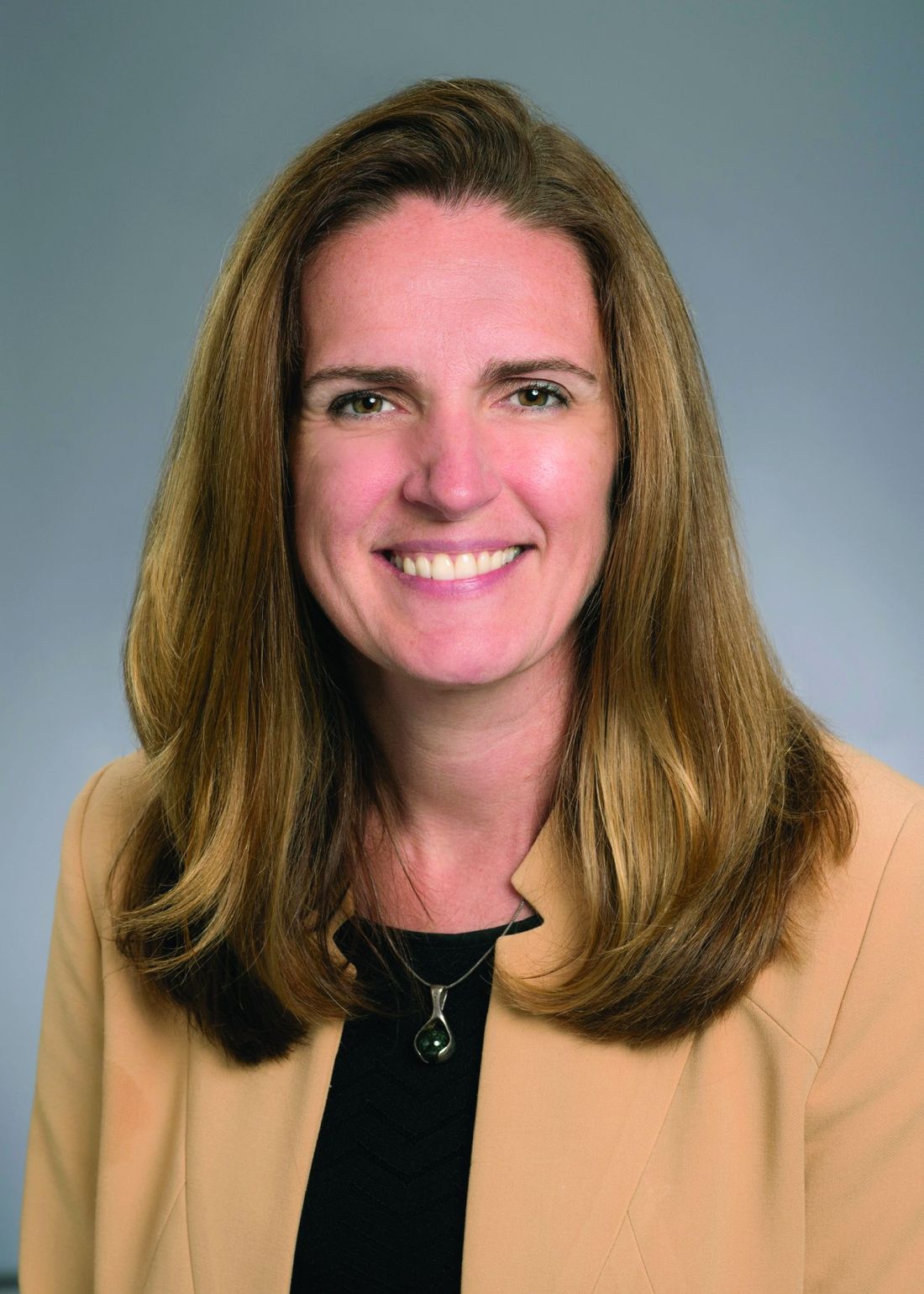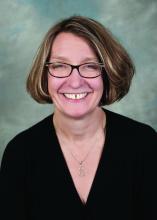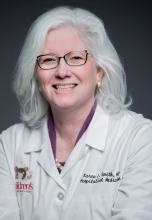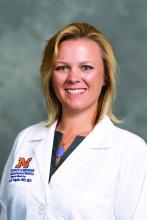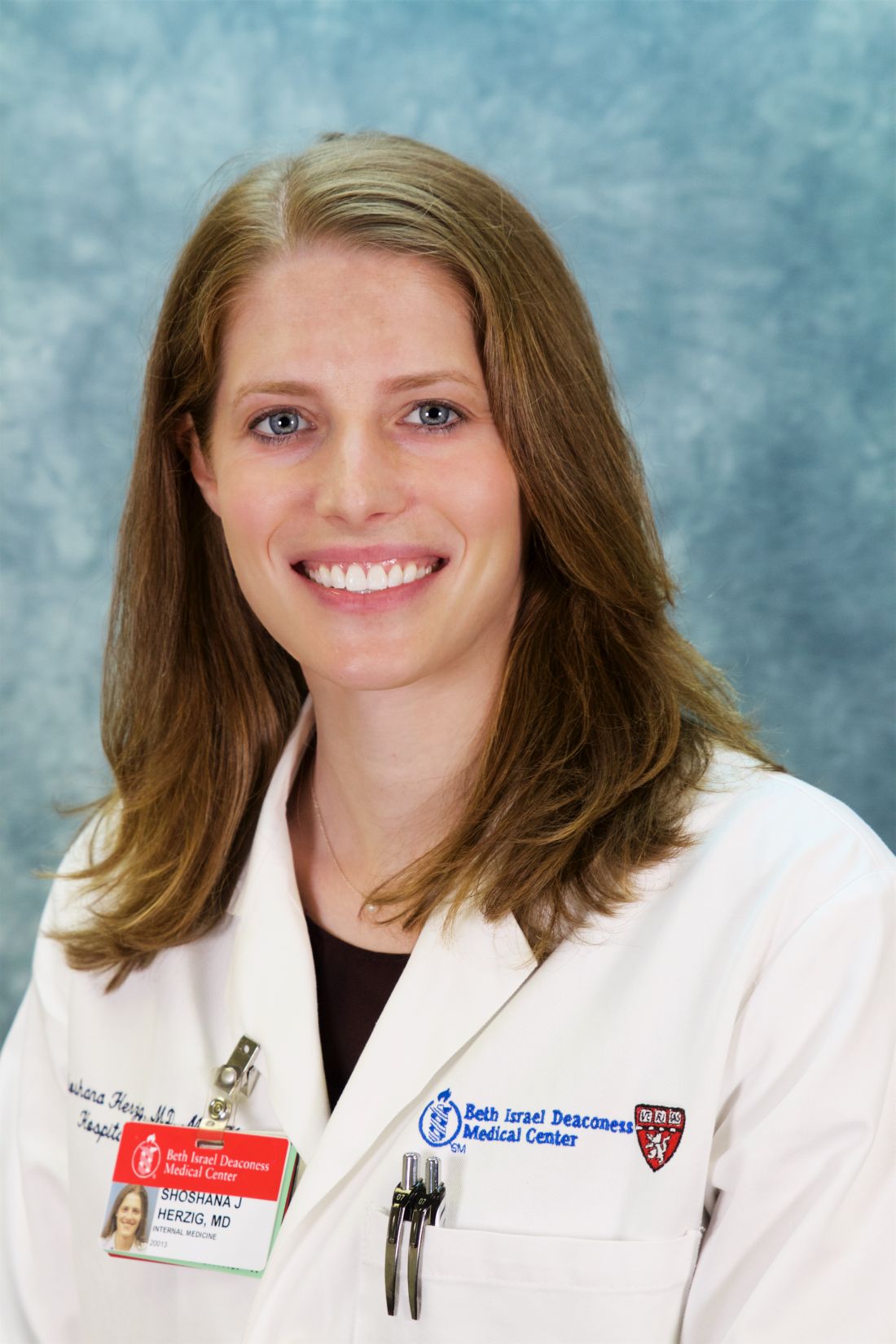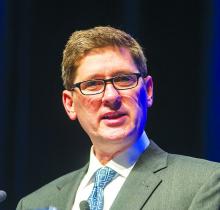User login
How can hospitalists address health disparities for LGBTQ+ patients?
It is well established that lesbian, gay, bisexual, transgender, and queer (LGBTQ) patients suffer worse health outcomes, relative to patients who are heterosexual and cisgender – that is, those whose sense of personal identity and gender corresponds with their birth sex. The reasons for these disparities are multifactorial but include discrimination and limited provider knowledge about LGBTQ-specific health concerns.
These disparities – and what hospitalists can do to try to ameliorate them on the job – will be explored in a session at HM20 Virtual, “When the Answers Aren’t Straight Forward: Lesbian, Gay, Bisexual, Transgender, and Queer (LGBTQ) Health Updates for the Hospitalist.”
, according to Tyler Anstett, DO, copresenter and assistant professor in the division of hospital medicine at the University of Colorado. He and copresenter Keshav Khanijow, MD, an assistant professor in the division of hospital medicine, Northwestern University, Chicago, will share results from the Q-HEALTH (Quantifying Hospitalist Education and Awareness of LGBTQ Topics in Health) national survey of SHM members about their knowledge and attitudes regarding LGBTQ health. This survey, sponsored by SHM’s Education Committee, identified knowledge and comfort gaps in caring for LGBTQ+ patients. Most respondents say they are interested in receiving more didactic training on this topic, building on an introductory session on LGBTQ+ health presented at last year’s SHM Annual Conference. They also named the Annual Conference as one of their top venues for receiving such training.
The session at HM20 Virtual will cover the health disparities identified in LGBTQ+ populations, with case examples that highlight those disparities, Dr. Anstett said. “We will review results from Q-HEALTH, the SHM-wide survey on provider attitudes, knowledge, and comfort in caring for LGBTQ+ patients. Finally, the session will cover basic LGBTQ+ terminology and, through clinical scenarios, provide attendees with some basic skills for improving their practice for LGBTQ+ patients.”
With over 11 million Americans who identify as lesbian, gay, bisexual, transgender, and/or queer, hospitalists will certainly encounter patients of diverse sexual orientations and gender identities, Dr. Anstett said. Hospitalists should serve as allies for their patients, including for those who are LGBTQ+. Through this session, attendees can reflect on individual practice and learn how to educate others on LGBTQ+ health basics.
“We hope the cases we present will provide attendees with an introduction to the health issues the LGBTQ+ community faces with greater prevalence, and what hospitalists can be thinking about when they approach these issues,” Dr. Khanijow added.
Dr. Anstett and Dr. Khanijow had no relevant financial conflicts to disclose.
When the Answers Aren’t Straight Forward: Lesbian, Gay, Bisexual, Transgender, and Queer (LGBTQ) Health Updates for the Hospitalist
It is well established that lesbian, gay, bisexual, transgender, and queer (LGBTQ) patients suffer worse health outcomes, relative to patients who are heterosexual and cisgender – that is, those whose sense of personal identity and gender corresponds with their birth sex. The reasons for these disparities are multifactorial but include discrimination and limited provider knowledge about LGBTQ-specific health concerns.
These disparities – and what hospitalists can do to try to ameliorate them on the job – will be explored in a session at HM20 Virtual, “When the Answers Aren’t Straight Forward: Lesbian, Gay, Bisexual, Transgender, and Queer (LGBTQ) Health Updates for the Hospitalist.”
, according to Tyler Anstett, DO, copresenter and assistant professor in the division of hospital medicine at the University of Colorado. He and copresenter Keshav Khanijow, MD, an assistant professor in the division of hospital medicine, Northwestern University, Chicago, will share results from the Q-HEALTH (Quantifying Hospitalist Education and Awareness of LGBTQ Topics in Health) national survey of SHM members about their knowledge and attitudes regarding LGBTQ health. This survey, sponsored by SHM’s Education Committee, identified knowledge and comfort gaps in caring for LGBTQ+ patients. Most respondents say they are interested in receiving more didactic training on this topic, building on an introductory session on LGBTQ+ health presented at last year’s SHM Annual Conference. They also named the Annual Conference as one of their top venues for receiving such training.
The session at HM20 Virtual will cover the health disparities identified in LGBTQ+ populations, with case examples that highlight those disparities, Dr. Anstett said. “We will review results from Q-HEALTH, the SHM-wide survey on provider attitudes, knowledge, and comfort in caring for LGBTQ+ patients. Finally, the session will cover basic LGBTQ+ terminology and, through clinical scenarios, provide attendees with some basic skills for improving their practice for LGBTQ+ patients.”
With over 11 million Americans who identify as lesbian, gay, bisexual, transgender, and/or queer, hospitalists will certainly encounter patients of diverse sexual orientations and gender identities, Dr. Anstett said. Hospitalists should serve as allies for their patients, including for those who are LGBTQ+. Through this session, attendees can reflect on individual practice and learn how to educate others on LGBTQ+ health basics.
“We hope the cases we present will provide attendees with an introduction to the health issues the LGBTQ+ community faces with greater prevalence, and what hospitalists can be thinking about when they approach these issues,” Dr. Khanijow added.
Dr. Anstett and Dr. Khanijow had no relevant financial conflicts to disclose.
When the Answers Aren’t Straight Forward: Lesbian, Gay, Bisexual, Transgender, and Queer (LGBTQ) Health Updates for the Hospitalist
It is well established that lesbian, gay, bisexual, transgender, and queer (LGBTQ) patients suffer worse health outcomes, relative to patients who are heterosexual and cisgender – that is, those whose sense of personal identity and gender corresponds with their birth sex. The reasons for these disparities are multifactorial but include discrimination and limited provider knowledge about LGBTQ-specific health concerns.
These disparities – and what hospitalists can do to try to ameliorate them on the job – will be explored in a session at HM20 Virtual, “When the Answers Aren’t Straight Forward: Lesbian, Gay, Bisexual, Transgender, and Queer (LGBTQ) Health Updates for the Hospitalist.”
, according to Tyler Anstett, DO, copresenter and assistant professor in the division of hospital medicine at the University of Colorado. He and copresenter Keshav Khanijow, MD, an assistant professor in the division of hospital medicine, Northwestern University, Chicago, will share results from the Q-HEALTH (Quantifying Hospitalist Education and Awareness of LGBTQ Topics in Health) national survey of SHM members about their knowledge and attitudes regarding LGBTQ health. This survey, sponsored by SHM’s Education Committee, identified knowledge and comfort gaps in caring for LGBTQ+ patients. Most respondents say they are interested in receiving more didactic training on this topic, building on an introductory session on LGBTQ+ health presented at last year’s SHM Annual Conference. They also named the Annual Conference as one of their top venues for receiving such training.
The session at HM20 Virtual will cover the health disparities identified in LGBTQ+ populations, with case examples that highlight those disparities, Dr. Anstett said. “We will review results from Q-HEALTH, the SHM-wide survey on provider attitudes, knowledge, and comfort in caring for LGBTQ+ patients. Finally, the session will cover basic LGBTQ+ terminology and, through clinical scenarios, provide attendees with some basic skills for improving their practice for LGBTQ+ patients.”
With over 11 million Americans who identify as lesbian, gay, bisexual, transgender, and/or queer, hospitalists will certainly encounter patients of diverse sexual orientations and gender identities, Dr. Anstett said. Hospitalists should serve as allies for their patients, including for those who are LGBTQ+. Through this session, attendees can reflect on individual practice and learn how to educate others on LGBTQ+ health basics.
“We hope the cases we present will provide attendees with an introduction to the health issues the LGBTQ+ community faces with greater prevalence, and what hospitalists can be thinking about when they approach these issues,” Dr. Khanijow added.
Dr. Anstett and Dr. Khanijow had no relevant financial conflicts to disclose.
When the Answers Aren’t Straight Forward: Lesbian, Gay, Bisexual, Transgender, and Queer (LGBTQ) Health Updates for the Hospitalist
Early recognition of oncologic emergencies deemed ‘crucial’
During an oncologic emergency, making a clinical decision during the early diagnostic period is one of the most critical things a hospitalist can do when caring for patients with cancer. Hospitalists may not always be well versed in the symptoms of oncologic emergencies, though, particularly with newer treatments like immunotherapy and targeted therapies. They also may be tempted to contact colleagues in oncology when they may be qualified to handle these emergencies on their own.
At the end of her question-and-answer session, “Getting to Know Oncology Emergencies: Recognition and Management” to be presented on Aug. 12 at HM20 Virtual, the virtual annual meeting of the Society of Hospital Medicine, Megan Kruse, MD, hopes hospitalists will be able to recognize the signs and symptoms of “classic” oncologic emergencies they are likely to see in routine practice, as well as side effects of newer therapies they may not have encountered. Attendees will know how to manage these situations and understand when they need to involve a cancer specialist.
“Early recognition of these emergencies is crucial, and there are simple initial interventions that can make a big difference in patient outcomes,” said Dr. Kruse, an oncologist at the Cleveland Clinic.
In her presentation, Dr. Kruse will review oncologic emergencies that can occur in patients with acute leukemia such as acute blast crisis, as well as spinal cord compression and neutropenic fever. These complications are common in patients with cancer: Many cancers, such as multiple myeloma, lung cancer, and breast cancer, can cause spinal metastases that lead to spinal cord compression, while studies have shown neutropenic fever can occur in up to 80% of patients who undergo chemotherapy.
The presentation also will outline how hospitalists can manage specific side effects of immunotherapy and targeted therapies during an emergency situation. Dr. Kruse noted the session also will focus on when to start steroids for immune-related adverse event concerns and when to think about adding alternate immunosuppression. Complications of these therapies can differ from those of traditional chemotherapy, and not all hospitalists may be expecting them. Side effects from cancer therapy also can present months after treatment, further complicating the nature of oncologic emergencies in a hospital setting.
Recognizing the signs of such emergencies can be crucial for patients, especially if clinical decisions are made before a hospitalist can reach an oncologist for consult. Some decisions can be made by hospitalists themselves, while others may require specialty knowledge from an oncologist, Dr. Kruse noted. Regardless, it is important to consider cancer treatment history in a patient’s differential diagnosis.
Dr. Kruse has given presentations on oncologic emergencies at SHM annual conferences in the past, but notes this year’s virtual presentation will include more cases and examples of complications to improve recognition of these conditions. in patients with oncologic emergencies.
“I hope that attendees will leave with a better idea of what symptoms should be, warning signs of impending oncologic emergencies/complications, and what measures can be taken to treat these conditions prior to oncology service involvement,” Dr. Kruse said.
Dr. Kruse reported advisory board involvement for Novartis Oncology and consulting for Puma Biotechnology.
Getting to Know Oncology Emergencies: Recognition and Management
Live Q&A: Wednesday, Aug. 12, 1:00 p.m. to 2:00 p.m.
During an oncologic emergency, making a clinical decision during the early diagnostic period is one of the most critical things a hospitalist can do when caring for patients with cancer. Hospitalists may not always be well versed in the symptoms of oncologic emergencies, though, particularly with newer treatments like immunotherapy and targeted therapies. They also may be tempted to contact colleagues in oncology when they may be qualified to handle these emergencies on their own.
At the end of her question-and-answer session, “Getting to Know Oncology Emergencies: Recognition and Management” to be presented on Aug. 12 at HM20 Virtual, the virtual annual meeting of the Society of Hospital Medicine, Megan Kruse, MD, hopes hospitalists will be able to recognize the signs and symptoms of “classic” oncologic emergencies they are likely to see in routine practice, as well as side effects of newer therapies they may not have encountered. Attendees will know how to manage these situations and understand when they need to involve a cancer specialist.
“Early recognition of these emergencies is crucial, and there are simple initial interventions that can make a big difference in patient outcomes,” said Dr. Kruse, an oncologist at the Cleveland Clinic.
In her presentation, Dr. Kruse will review oncologic emergencies that can occur in patients with acute leukemia such as acute blast crisis, as well as spinal cord compression and neutropenic fever. These complications are common in patients with cancer: Many cancers, such as multiple myeloma, lung cancer, and breast cancer, can cause spinal metastases that lead to spinal cord compression, while studies have shown neutropenic fever can occur in up to 80% of patients who undergo chemotherapy.
The presentation also will outline how hospitalists can manage specific side effects of immunotherapy and targeted therapies during an emergency situation. Dr. Kruse noted the session also will focus on when to start steroids for immune-related adverse event concerns and when to think about adding alternate immunosuppression. Complications of these therapies can differ from those of traditional chemotherapy, and not all hospitalists may be expecting them. Side effects from cancer therapy also can present months after treatment, further complicating the nature of oncologic emergencies in a hospital setting.
Recognizing the signs of such emergencies can be crucial for patients, especially if clinical decisions are made before a hospitalist can reach an oncologist for consult. Some decisions can be made by hospitalists themselves, while others may require specialty knowledge from an oncologist, Dr. Kruse noted. Regardless, it is important to consider cancer treatment history in a patient’s differential diagnosis.
Dr. Kruse has given presentations on oncologic emergencies at SHM annual conferences in the past, but notes this year’s virtual presentation will include more cases and examples of complications to improve recognition of these conditions. in patients with oncologic emergencies.
“I hope that attendees will leave with a better idea of what symptoms should be, warning signs of impending oncologic emergencies/complications, and what measures can be taken to treat these conditions prior to oncology service involvement,” Dr. Kruse said.
Dr. Kruse reported advisory board involvement for Novartis Oncology and consulting for Puma Biotechnology.
Getting to Know Oncology Emergencies: Recognition and Management
Live Q&A: Wednesday, Aug. 12, 1:00 p.m. to 2:00 p.m.
During an oncologic emergency, making a clinical decision during the early diagnostic period is one of the most critical things a hospitalist can do when caring for patients with cancer. Hospitalists may not always be well versed in the symptoms of oncologic emergencies, though, particularly with newer treatments like immunotherapy and targeted therapies. They also may be tempted to contact colleagues in oncology when they may be qualified to handle these emergencies on their own.
At the end of her question-and-answer session, “Getting to Know Oncology Emergencies: Recognition and Management” to be presented on Aug. 12 at HM20 Virtual, the virtual annual meeting of the Society of Hospital Medicine, Megan Kruse, MD, hopes hospitalists will be able to recognize the signs and symptoms of “classic” oncologic emergencies they are likely to see in routine practice, as well as side effects of newer therapies they may not have encountered. Attendees will know how to manage these situations and understand when they need to involve a cancer specialist.
“Early recognition of these emergencies is crucial, and there are simple initial interventions that can make a big difference in patient outcomes,” said Dr. Kruse, an oncologist at the Cleveland Clinic.
In her presentation, Dr. Kruse will review oncologic emergencies that can occur in patients with acute leukemia such as acute blast crisis, as well as spinal cord compression and neutropenic fever. These complications are common in patients with cancer: Many cancers, such as multiple myeloma, lung cancer, and breast cancer, can cause spinal metastases that lead to spinal cord compression, while studies have shown neutropenic fever can occur in up to 80% of patients who undergo chemotherapy.
The presentation also will outline how hospitalists can manage specific side effects of immunotherapy and targeted therapies during an emergency situation. Dr. Kruse noted the session also will focus on when to start steroids for immune-related adverse event concerns and when to think about adding alternate immunosuppression. Complications of these therapies can differ from those of traditional chemotherapy, and not all hospitalists may be expecting them. Side effects from cancer therapy also can present months after treatment, further complicating the nature of oncologic emergencies in a hospital setting.
Recognizing the signs of such emergencies can be crucial for patients, especially if clinical decisions are made before a hospitalist can reach an oncologist for consult. Some decisions can be made by hospitalists themselves, while others may require specialty knowledge from an oncologist, Dr. Kruse noted. Regardless, it is important to consider cancer treatment history in a patient’s differential diagnosis.
Dr. Kruse has given presentations on oncologic emergencies at SHM annual conferences in the past, but notes this year’s virtual presentation will include more cases and examples of complications to improve recognition of these conditions. in patients with oncologic emergencies.
“I hope that attendees will leave with a better idea of what symptoms should be, warning signs of impending oncologic emergencies/complications, and what measures can be taken to treat these conditions prior to oncology service involvement,” Dr. Kruse said.
Dr. Kruse reported advisory board involvement for Novartis Oncology and consulting for Puma Biotechnology.
Getting to Know Oncology Emergencies: Recognition and Management
Live Q&A: Wednesday, Aug. 12, 1:00 p.m. to 2:00 p.m.
Simplifying the antibiotic selection process
Hospitalists are constantly battling infection.
James Soo Kim, MD, a hospitalist and assistant professor at Emory Healthcare in Atlanta, a presenter of the session “Antibiotics Made Ridiculously Simple” during HM20 Virtual, said that while he has given this talk at previous Society of Hospital Medicine Annual Conferences, the presentation has undergone significant changes over the years as the landscape of infectious disease treatment has shifted.
He hopes attendees of HM20 Virtual will appreciate the changes and encourages those who have attended his presentation in previous years to come see what is new, but admitted newcomers may think the presentation’s title is a bit of a misnomer.
“Despite the title of the talk, there really isn’t any way to make antibiotics ridiculously simple,” he said.
Dr. Kim, who is also an editorial board member for The Hospitalist, said the origin of “Antibiotics Made Ridiculously Simple” took place during his residency, where he had an interest in infectious disease. This interest carried over to his time in fellowship at the Keck School of Medicine of the University of Southern California – and was enough to become board certified in infectious disease by the American Board of Internal Medicine. Infectious disease continues to interest him now as an attending, he said, and since he joined Emory Healthcare in 2012, he has given a version of this presentation every year.
HM20 Virtual attendees will come away from the presentation with an idea of how to choose an antibiotic regimen, Dr. Kim said, including how to select an antibiotic when you’re worried about Pseudomonas, methicillin-resistant Staphylococcus aureus, and vancomycin-resistant Enterococcus or other likely organisms. “There are a variety of drugs out there that have activity against our ‘usual suspects,’ ” he said.
Attendees will also learn to select antibiotic options that have empiric coverage during a shortage of piperacillin/tazobactam (Zosyn), vancomycin, or your preferred drug of choice for treating common infections. He will also review the latest drugs that have been released over the past few years so attendees can add them to their armamentarium.
“I won’t necessarily expect attendees to use everything I talk about, but if you have a patient on service that infectious disease started Vabomere on, you’ll at least have a general idea of what they were worried about,” Dr. Kim said.
One practice pearl he hopes attendees take away from his presentation: Allergies to beta-lactam antibiotics like penicillin (PCN) derivatives are not as common as most providers and patients believe, and not giving these antibiotics to patients can actually decrease the chance that the patient gets appropriate therapy while also increasing the cost of care.
“I hope that my talk changes practice by making people aware of how infrequent true clinically significant PCN cross-reactions are so that patients can get more cost-effective and medically effective therapy,” he said.Dr. Kim reports no relevant financial disclosures.
Antibiotics Made Ridiculously Simple Live Q&A: Tuesday, August 18, 3:30-4:30 p.m.
Hospitalists are constantly battling infection.
James Soo Kim, MD, a hospitalist and assistant professor at Emory Healthcare in Atlanta, a presenter of the session “Antibiotics Made Ridiculously Simple” during HM20 Virtual, said that while he has given this talk at previous Society of Hospital Medicine Annual Conferences, the presentation has undergone significant changes over the years as the landscape of infectious disease treatment has shifted.
He hopes attendees of HM20 Virtual will appreciate the changes and encourages those who have attended his presentation in previous years to come see what is new, but admitted newcomers may think the presentation’s title is a bit of a misnomer.
“Despite the title of the talk, there really isn’t any way to make antibiotics ridiculously simple,” he said.
Dr. Kim, who is also an editorial board member for The Hospitalist, said the origin of “Antibiotics Made Ridiculously Simple” took place during his residency, where he had an interest in infectious disease. This interest carried over to his time in fellowship at the Keck School of Medicine of the University of Southern California – and was enough to become board certified in infectious disease by the American Board of Internal Medicine. Infectious disease continues to interest him now as an attending, he said, and since he joined Emory Healthcare in 2012, he has given a version of this presentation every year.
HM20 Virtual attendees will come away from the presentation with an idea of how to choose an antibiotic regimen, Dr. Kim said, including how to select an antibiotic when you’re worried about Pseudomonas, methicillin-resistant Staphylococcus aureus, and vancomycin-resistant Enterococcus or other likely organisms. “There are a variety of drugs out there that have activity against our ‘usual suspects,’ ” he said.
Attendees will also learn to select antibiotic options that have empiric coverage during a shortage of piperacillin/tazobactam (Zosyn), vancomycin, or your preferred drug of choice for treating common infections. He will also review the latest drugs that have been released over the past few years so attendees can add them to their armamentarium.
“I won’t necessarily expect attendees to use everything I talk about, but if you have a patient on service that infectious disease started Vabomere on, you’ll at least have a general idea of what they were worried about,” Dr. Kim said.
One practice pearl he hopes attendees take away from his presentation: Allergies to beta-lactam antibiotics like penicillin (PCN) derivatives are not as common as most providers and patients believe, and not giving these antibiotics to patients can actually decrease the chance that the patient gets appropriate therapy while also increasing the cost of care.
“I hope that my talk changes practice by making people aware of how infrequent true clinically significant PCN cross-reactions are so that patients can get more cost-effective and medically effective therapy,” he said.Dr. Kim reports no relevant financial disclosures.
Antibiotics Made Ridiculously Simple Live Q&A: Tuesday, August 18, 3:30-4:30 p.m.
Hospitalists are constantly battling infection.
James Soo Kim, MD, a hospitalist and assistant professor at Emory Healthcare in Atlanta, a presenter of the session “Antibiotics Made Ridiculously Simple” during HM20 Virtual, said that while he has given this talk at previous Society of Hospital Medicine Annual Conferences, the presentation has undergone significant changes over the years as the landscape of infectious disease treatment has shifted.
He hopes attendees of HM20 Virtual will appreciate the changes and encourages those who have attended his presentation in previous years to come see what is new, but admitted newcomers may think the presentation’s title is a bit of a misnomer.
“Despite the title of the talk, there really isn’t any way to make antibiotics ridiculously simple,” he said.
Dr. Kim, who is also an editorial board member for The Hospitalist, said the origin of “Antibiotics Made Ridiculously Simple” took place during his residency, where he had an interest in infectious disease. This interest carried over to his time in fellowship at the Keck School of Medicine of the University of Southern California – and was enough to become board certified in infectious disease by the American Board of Internal Medicine. Infectious disease continues to interest him now as an attending, he said, and since he joined Emory Healthcare in 2012, he has given a version of this presentation every year.
HM20 Virtual attendees will come away from the presentation with an idea of how to choose an antibiotic regimen, Dr. Kim said, including how to select an antibiotic when you’re worried about Pseudomonas, methicillin-resistant Staphylococcus aureus, and vancomycin-resistant Enterococcus or other likely organisms. “There are a variety of drugs out there that have activity against our ‘usual suspects,’ ” he said.
Attendees will also learn to select antibiotic options that have empiric coverage during a shortage of piperacillin/tazobactam (Zosyn), vancomycin, or your preferred drug of choice for treating common infections. He will also review the latest drugs that have been released over the past few years so attendees can add them to their armamentarium.
“I won’t necessarily expect attendees to use everything I talk about, but if you have a patient on service that infectious disease started Vabomere on, you’ll at least have a general idea of what they were worried about,” Dr. Kim said.
One practice pearl he hopes attendees take away from his presentation: Allergies to beta-lactam antibiotics like penicillin (PCN) derivatives are not as common as most providers and patients believe, and not giving these antibiotics to patients can actually decrease the chance that the patient gets appropriate therapy while also increasing the cost of care.
“I hope that my talk changes practice by making people aware of how infrequent true clinically significant PCN cross-reactions are so that patients can get more cost-effective and medically effective therapy,” he said.Dr. Kim reports no relevant financial disclosures.
Antibiotics Made Ridiculously Simple Live Q&A: Tuesday, August 18, 3:30-4:30 p.m.
Hospital medicine update highlights research from ‘extended family’
The annual “Update in Hospital Medicine” session will go a step further by highlighting the work and insights of what Dr. Pfeifer affectionately calls the “extended family.”
Scott Kaatz, DO, MSc, SFHM, a hospitalist at Henry Ford Hospital in Detroit, explained that “the Update has a long-standing tradition at the national meeting as an overview of the most impactful or insightful publications relevant to clinicians working in the hospital, which includes internists, pediatricians, obstetricians, family physicians, nurse practitioners, physician assistants, and other specialties.”
Why does the Update embrace such a wide focus? Because there’s a need for a broader perspective, according to Dr. Pfeifer, professor of medicine at the Medical College of Wisconsin, Milwaukee. “The Society of Hospital Medicine Annual Conference has many superb offerings with specific focuses that help attendees fill knowledge and practice gaps and network with individuals with similar interests,” he said. “All of those different offerings highlight something that is very cool about hospital medicine – its diversity. However, it’s also important for us to come together as one big family to support each other and advocate for the larger cause of hospital medicine. With the “Update in Hospital Medicine,” attendees can specifically hear about the clinical changes happening in their “extended family.”
“We will be giving an overview of key new literature across the spectrum of hospital medicine in areas such as sepsis, inclusion/diversity, co-management, and hospital staffing models,” Dr. Kaatz said. “We will also highlight the various different focuses/practices within hospital medicine and the wonderful diversity within the Society of Hospital Medicine. We have coordinated our selection of topics with the Special Interest Groups (SIGs) and the Chapters to make sure we include the voices of our wider membership. This will also allow us to celebrate our diversity by giving shout outs to our SIGs and chapters and showcase the wonderful things going on in hospital medicine, including advances being made by our very own members.”
Dr. Kaatz added that he and Dr. Pfeifer are grateful to the organizers for allowing them to try something new. “Presented papers will reflect the interests of SHM members via a ‘learner needs assessment’ survey,” he said. “Several of the special interest groups and local chapters surveyed their membership and voted on the most impactful papers in the past year. It has been very gratifying to see the level of engagement in our society and to be able to share this important research with a large audience.”
Dr. Pfeifer has no relevant disclosures. Dr. Kaatz discloses research funding to institution (BMS) and consultant/advisory board relationships (BMS, Pfizer and Janssen).
“Update in Hospital Medicine”
The annual “Update in Hospital Medicine” session will go a step further by highlighting the work and insights of what Dr. Pfeifer affectionately calls the “extended family.”
Scott Kaatz, DO, MSc, SFHM, a hospitalist at Henry Ford Hospital in Detroit, explained that “the Update has a long-standing tradition at the national meeting as an overview of the most impactful or insightful publications relevant to clinicians working in the hospital, which includes internists, pediatricians, obstetricians, family physicians, nurse practitioners, physician assistants, and other specialties.”
Why does the Update embrace such a wide focus? Because there’s a need for a broader perspective, according to Dr. Pfeifer, professor of medicine at the Medical College of Wisconsin, Milwaukee. “The Society of Hospital Medicine Annual Conference has many superb offerings with specific focuses that help attendees fill knowledge and practice gaps and network with individuals with similar interests,” he said. “All of those different offerings highlight something that is very cool about hospital medicine – its diversity. However, it’s also important for us to come together as one big family to support each other and advocate for the larger cause of hospital medicine. With the “Update in Hospital Medicine,” attendees can specifically hear about the clinical changes happening in their “extended family.”
“We will be giving an overview of key new literature across the spectrum of hospital medicine in areas such as sepsis, inclusion/diversity, co-management, and hospital staffing models,” Dr. Kaatz said. “We will also highlight the various different focuses/practices within hospital medicine and the wonderful diversity within the Society of Hospital Medicine. We have coordinated our selection of topics with the Special Interest Groups (SIGs) and the Chapters to make sure we include the voices of our wider membership. This will also allow us to celebrate our diversity by giving shout outs to our SIGs and chapters and showcase the wonderful things going on in hospital medicine, including advances being made by our very own members.”
Dr. Kaatz added that he and Dr. Pfeifer are grateful to the organizers for allowing them to try something new. “Presented papers will reflect the interests of SHM members via a ‘learner needs assessment’ survey,” he said. “Several of the special interest groups and local chapters surveyed their membership and voted on the most impactful papers in the past year. It has been very gratifying to see the level of engagement in our society and to be able to share this important research with a large audience.”
Dr. Pfeifer has no relevant disclosures. Dr. Kaatz discloses research funding to institution (BMS) and consultant/advisory board relationships (BMS, Pfizer and Janssen).
“Update in Hospital Medicine”
The annual “Update in Hospital Medicine” session will go a step further by highlighting the work and insights of what Dr. Pfeifer affectionately calls the “extended family.”
Scott Kaatz, DO, MSc, SFHM, a hospitalist at Henry Ford Hospital in Detroit, explained that “the Update has a long-standing tradition at the national meeting as an overview of the most impactful or insightful publications relevant to clinicians working in the hospital, which includes internists, pediatricians, obstetricians, family physicians, nurse practitioners, physician assistants, and other specialties.”
Why does the Update embrace such a wide focus? Because there’s a need for a broader perspective, according to Dr. Pfeifer, professor of medicine at the Medical College of Wisconsin, Milwaukee. “The Society of Hospital Medicine Annual Conference has many superb offerings with specific focuses that help attendees fill knowledge and practice gaps and network with individuals with similar interests,” he said. “All of those different offerings highlight something that is very cool about hospital medicine – its diversity. However, it’s also important for us to come together as one big family to support each other and advocate for the larger cause of hospital medicine. With the “Update in Hospital Medicine,” attendees can specifically hear about the clinical changes happening in their “extended family.”
“We will be giving an overview of key new literature across the spectrum of hospital medicine in areas such as sepsis, inclusion/diversity, co-management, and hospital staffing models,” Dr. Kaatz said. “We will also highlight the various different focuses/practices within hospital medicine and the wonderful diversity within the Society of Hospital Medicine. We have coordinated our selection of topics with the Special Interest Groups (SIGs) and the Chapters to make sure we include the voices of our wider membership. This will also allow us to celebrate our diversity by giving shout outs to our SIGs and chapters and showcase the wonderful things going on in hospital medicine, including advances being made by our very own members.”
Dr. Kaatz added that he and Dr. Pfeifer are grateful to the organizers for allowing them to try something new. “Presented papers will reflect the interests of SHM members via a ‘learner needs assessment’ survey,” he said. “Several of the special interest groups and local chapters surveyed their membership and voted on the most impactful papers in the past year. It has been very gratifying to see the level of engagement in our society and to be able to share this important research with a large audience.”
Dr. Pfeifer has no relevant disclosures. Dr. Kaatz discloses research funding to institution (BMS) and consultant/advisory board relationships (BMS, Pfizer and Janssen).
“Update in Hospital Medicine”
Get updated: Latest ATS/ISDA guidelines for pneumonia
according to Joanna M. Bonsall, MD, PhD, SFHM, chief of hospital medicine at Grady Memorial Hospital and associate professor of medicine at Emory University, both in Atlanta.
Last year, the American Thoracic Society and the Infectious Diseases Society of America updated their clinical guidelines on community-acquired pneumonia (CAP) for the first time since 2007. The guidelines were published in the Oct. 1, 2019 issue of the American Journal of Respiratory and Critical Care Medicine.
CAP is one of the most common reasons for hospitalization in the United States, and it is estimated that CAP comprises over 4.5 million outpatient and ED visits each year, according to the National Ambulatory Medical Care Survey and National Hospital Ambulatory Medical Care Survey in 2009-2010. It is also the most common cause of death from infection disease, according to the Centers for Disease Control and Prevention.
Dr. Bonsall will present “Updates in Pneumonia” at HM20 Virtual, the virtual annual meeting of the Society of Hospital Medicine; a live question-and-answer session will be held online Aug. 20. In her session, Dr. Bonsall said she plans to cover the new ATS/IDSA guidelines for CAP, which will include what initial testing to order, which empiric antibiotics to use, and how to manage patients at risk for resistant organisms, formerly known as health care–associated pneumonia (HCAP). Dr. Bonsall also will outline the evidence for use of steroids, especially in cases of severe pneumonia, and review the 2016 ATS/IDSA guidelines for hospital-acquired pneumonia with a focus on antibiotic selection.
One major change for 2019: The ATS/IDSA CAP guideline authors issued a strong recommendation to abandon use of the term HCAP as a “distinct clinical entity” when considering antibiotics for patients with CAP. In addition, methicillin-resistant Staphylococcus aureus and Pseudomonas aeruginosa should only be empirically covered in patients with CAP if they present with locally validated risk factors for either pathogen, according to the guidelines.
“Order pretreatment testing based on severity of illness as well as risk factors for drug-resistant pathogens,” Dr. Bonsall said. Hospitalists also should avoid using procalcitonin levels as a benchmark for whether a patient should be started on antibiotics. Once the recommended antibiotic treatment has been initiated, attendees should use culture results to narrow down the possibilities, especially in cases of drug-resistant pathogens.
The ATS/IDSA guidelines also state that corticosteroids should not be routinely used for patients with nonsevere CAP, but attendees should also be aware of the limitations and interpretations of the evidence, Dr. Bonsall said. Avoiding routine corticosteroid use in patients with severe CAP or in patients with severe influenza pneumonia carries a conditional recommendation with a moderate and low quality of evidence, respectively. In general, cases of CAP should be treated for no more than 5 days, or 3 days of treatment after the patient becomes clinically stable.
Attendees at HM20 Virtual should walk away from the session knowing what testing is necessary and what testing is unnecessary, and how to reduce antibiotic exposure for both broad spectrum use and duration. “At the end of the session, you should feel comfortable using both the CAP and HAP guidelines,” Dr. Bonsall said.
Dr. Bonsall reported no relevant financial disclosures.
Updates in Pneumonia
Live Q&A: Thursday, Aug. 20, 2:15 p.m to 3:15 p.m.
according to Joanna M. Bonsall, MD, PhD, SFHM, chief of hospital medicine at Grady Memorial Hospital and associate professor of medicine at Emory University, both in Atlanta.
Last year, the American Thoracic Society and the Infectious Diseases Society of America updated their clinical guidelines on community-acquired pneumonia (CAP) for the first time since 2007. The guidelines were published in the Oct. 1, 2019 issue of the American Journal of Respiratory and Critical Care Medicine.
CAP is one of the most common reasons for hospitalization in the United States, and it is estimated that CAP comprises over 4.5 million outpatient and ED visits each year, according to the National Ambulatory Medical Care Survey and National Hospital Ambulatory Medical Care Survey in 2009-2010. It is also the most common cause of death from infection disease, according to the Centers for Disease Control and Prevention.
Dr. Bonsall will present “Updates in Pneumonia” at HM20 Virtual, the virtual annual meeting of the Society of Hospital Medicine; a live question-and-answer session will be held online Aug. 20. In her session, Dr. Bonsall said she plans to cover the new ATS/IDSA guidelines for CAP, which will include what initial testing to order, which empiric antibiotics to use, and how to manage patients at risk for resistant organisms, formerly known as health care–associated pneumonia (HCAP). Dr. Bonsall also will outline the evidence for use of steroids, especially in cases of severe pneumonia, and review the 2016 ATS/IDSA guidelines for hospital-acquired pneumonia with a focus on antibiotic selection.
One major change for 2019: The ATS/IDSA CAP guideline authors issued a strong recommendation to abandon use of the term HCAP as a “distinct clinical entity” when considering antibiotics for patients with CAP. In addition, methicillin-resistant Staphylococcus aureus and Pseudomonas aeruginosa should only be empirically covered in patients with CAP if they present with locally validated risk factors for either pathogen, according to the guidelines.
“Order pretreatment testing based on severity of illness as well as risk factors for drug-resistant pathogens,” Dr. Bonsall said. Hospitalists also should avoid using procalcitonin levels as a benchmark for whether a patient should be started on antibiotics. Once the recommended antibiotic treatment has been initiated, attendees should use culture results to narrow down the possibilities, especially in cases of drug-resistant pathogens.
The ATS/IDSA guidelines also state that corticosteroids should not be routinely used for patients with nonsevere CAP, but attendees should also be aware of the limitations and interpretations of the evidence, Dr. Bonsall said. Avoiding routine corticosteroid use in patients with severe CAP or in patients with severe influenza pneumonia carries a conditional recommendation with a moderate and low quality of evidence, respectively. In general, cases of CAP should be treated for no more than 5 days, or 3 days of treatment after the patient becomes clinically stable.
Attendees at HM20 Virtual should walk away from the session knowing what testing is necessary and what testing is unnecessary, and how to reduce antibiotic exposure for both broad spectrum use and duration. “At the end of the session, you should feel comfortable using both the CAP and HAP guidelines,” Dr. Bonsall said.
Dr. Bonsall reported no relevant financial disclosures.
Updates in Pneumonia
Live Q&A: Thursday, Aug. 20, 2:15 p.m to 3:15 p.m.
according to Joanna M. Bonsall, MD, PhD, SFHM, chief of hospital medicine at Grady Memorial Hospital and associate professor of medicine at Emory University, both in Atlanta.
Last year, the American Thoracic Society and the Infectious Diseases Society of America updated their clinical guidelines on community-acquired pneumonia (CAP) for the first time since 2007. The guidelines were published in the Oct. 1, 2019 issue of the American Journal of Respiratory and Critical Care Medicine.
CAP is one of the most common reasons for hospitalization in the United States, and it is estimated that CAP comprises over 4.5 million outpatient and ED visits each year, according to the National Ambulatory Medical Care Survey and National Hospital Ambulatory Medical Care Survey in 2009-2010. It is also the most common cause of death from infection disease, according to the Centers for Disease Control and Prevention.
Dr. Bonsall will present “Updates in Pneumonia” at HM20 Virtual, the virtual annual meeting of the Society of Hospital Medicine; a live question-and-answer session will be held online Aug. 20. In her session, Dr. Bonsall said she plans to cover the new ATS/IDSA guidelines for CAP, which will include what initial testing to order, which empiric antibiotics to use, and how to manage patients at risk for resistant organisms, formerly known as health care–associated pneumonia (HCAP). Dr. Bonsall also will outline the evidence for use of steroids, especially in cases of severe pneumonia, and review the 2016 ATS/IDSA guidelines for hospital-acquired pneumonia with a focus on antibiotic selection.
One major change for 2019: The ATS/IDSA CAP guideline authors issued a strong recommendation to abandon use of the term HCAP as a “distinct clinical entity” when considering antibiotics for patients with CAP. In addition, methicillin-resistant Staphylococcus aureus and Pseudomonas aeruginosa should only be empirically covered in patients with CAP if they present with locally validated risk factors for either pathogen, according to the guidelines.
“Order pretreatment testing based on severity of illness as well as risk factors for drug-resistant pathogens,” Dr. Bonsall said. Hospitalists also should avoid using procalcitonin levels as a benchmark for whether a patient should be started on antibiotics. Once the recommended antibiotic treatment has been initiated, attendees should use culture results to narrow down the possibilities, especially in cases of drug-resistant pathogens.
The ATS/IDSA guidelines also state that corticosteroids should not be routinely used for patients with nonsevere CAP, but attendees should also be aware of the limitations and interpretations of the evidence, Dr. Bonsall said. Avoiding routine corticosteroid use in patients with severe CAP or in patients with severe influenza pneumonia carries a conditional recommendation with a moderate and low quality of evidence, respectively. In general, cases of CAP should be treated for no more than 5 days, or 3 days of treatment after the patient becomes clinically stable.
Attendees at HM20 Virtual should walk away from the session knowing what testing is necessary and what testing is unnecessary, and how to reduce antibiotic exposure for both broad spectrum use and duration. “At the end of the session, you should feel comfortable using both the CAP and HAP guidelines,” Dr. Bonsall said.
Dr. Bonsall reported no relevant financial disclosures.
Updates in Pneumonia
Live Q&A: Thursday, Aug. 20, 2:15 p.m to 3:15 p.m.
Sepsis: Vitamin C, thiamine, glucocorticoids remain controversial
Sepsis is the number one killer in U.S. hospitals. About one in three patient deaths in a hospital are attributable to sepsis, according to the Centers for Disease Control and Prevention, and it is the leading cause of readmission for U.S. hospitals as well.
Patricia Kritek MD, EdM, of the division of pulmonary, critical care, and sleep medicine at the University of Washington, Seattle, hopes to bring attendees up to speed on sepsis with her presentation, “Put SIRS on the SOFA and Let’s get Septic! Update in Sepsis” at HM20 Virtual.
Each year, approximately 1.7 million American adults develop sepsis, and nearly 270,000 Americans will die from sepsis annually. Although sepsis disproportionately affects young children, older adults, patients with chronic diseases, and those with a weak immune system, the disease can affect anyone.
With that reputation, sepsis is on the forefront of hospitalists’ minds. Hospitalists are traditionally well versed in current sepsis guidelines, but time to treatment is paramount, and it can be difficult to stay up to date on the latest studies in the field.
The title of Dr. Kritek’s presentation hints at the theme: Hospitalists may have learned the systemic inflammatory response syndrome (SIRS) criteria for diagnosing sepsis, but the Sequential Organ Failure Assessment (SOFA) Score developed by the Third International Consensus Definitions for Sepsis and Septic Shock – previously known as the sepsis-related organ failure assessment score – has been the new method since 2016 to assess the clinical outcomes of patients with sepsis.
The quick SOFA score (qSOFA), developed by the Society of Critical Care and European Society of Intensive Care Medicine in 2016 guidelines, further helps hospitalists and other hospital physicians identify those patients at highest risk of mortality from sepsis outside an intensive care unit setting.
Dr. Kritek, who is a board-certified critical care medicine physician, has previously presented this talk at the Society for Hospital Medicine Annual Conference in the past. This year the presentation will include a number of studies that examine what role vitamin C, thiamine, and glucocorticoids have in treating patients with sepsis, she said. For example, it is thought that parenteral administration of vitamin C could raise plasma levels and reduce multiorgan failure. Thiamine could be useful in sepsis treatment because of its role in glucose metabolism and lactate production, while glucocorticoids could help improve the mortality rate of patients with sepsis.
While Dr. Kritek said she is not going to be advocating for the benefit of vitamin C and thiamine during the session, “this is an area of ongoing debate, and we will walk through the most recent data to try to make sense of it,” she said.
Dr. Kritek noted that the role of balanced crystalloids in resuscitation will be discussed versus when to use saline, as well as the potential of new vasopressors for the treatment of septic shock.
“Our goal will be to integrate the most recent literature into day-to-day practice,” Dr. Kritek said.Dr. Kritek reports no conflicts of interest.
“Put SIRS on the SOFA and Let’s get Septic! Update in Sepsis”
Sepsis is the number one killer in U.S. hospitals. About one in three patient deaths in a hospital are attributable to sepsis, according to the Centers for Disease Control and Prevention, and it is the leading cause of readmission for U.S. hospitals as well.
Patricia Kritek MD, EdM, of the division of pulmonary, critical care, and sleep medicine at the University of Washington, Seattle, hopes to bring attendees up to speed on sepsis with her presentation, “Put SIRS on the SOFA and Let’s get Septic! Update in Sepsis” at HM20 Virtual.
Each year, approximately 1.7 million American adults develop sepsis, and nearly 270,000 Americans will die from sepsis annually. Although sepsis disproportionately affects young children, older adults, patients with chronic diseases, and those with a weak immune system, the disease can affect anyone.
With that reputation, sepsis is on the forefront of hospitalists’ minds. Hospitalists are traditionally well versed in current sepsis guidelines, but time to treatment is paramount, and it can be difficult to stay up to date on the latest studies in the field.
The title of Dr. Kritek’s presentation hints at the theme: Hospitalists may have learned the systemic inflammatory response syndrome (SIRS) criteria for diagnosing sepsis, but the Sequential Organ Failure Assessment (SOFA) Score developed by the Third International Consensus Definitions for Sepsis and Septic Shock – previously known as the sepsis-related organ failure assessment score – has been the new method since 2016 to assess the clinical outcomes of patients with sepsis.
The quick SOFA score (qSOFA), developed by the Society of Critical Care and European Society of Intensive Care Medicine in 2016 guidelines, further helps hospitalists and other hospital physicians identify those patients at highest risk of mortality from sepsis outside an intensive care unit setting.
Dr. Kritek, who is a board-certified critical care medicine physician, has previously presented this talk at the Society for Hospital Medicine Annual Conference in the past. This year the presentation will include a number of studies that examine what role vitamin C, thiamine, and glucocorticoids have in treating patients with sepsis, she said. For example, it is thought that parenteral administration of vitamin C could raise plasma levels and reduce multiorgan failure. Thiamine could be useful in sepsis treatment because of its role in glucose metabolism and lactate production, while glucocorticoids could help improve the mortality rate of patients with sepsis.
While Dr. Kritek said she is not going to be advocating for the benefit of vitamin C and thiamine during the session, “this is an area of ongoing debate, and we will walk through the most recent data to try to make sense of it,” she said.
Dr. Kritek noted that the role of balanced crystalloids in resuscitation will be discussed versus when to use saline, as well as the potential of new vasopressors for the treatment of septic shock.
“Our goal will be to integrate the most recent literature into day-to-day practice,” Dr. Kritek said.Dr. Kritek reports no conflicts of interest.
“Put SIRS on the SOFA and Let’s get Septic! Update in Sepsis”
Sepsis is the number one killer in U.S. hospitals. About one in three patient deaths in a hospital are attributable to sepsis, according to the Centers for Disease Control and Prevention, and it is the leading cause of readmission for U.S. hospitals as well.
Patricia Kritek MD, EdM, of the division of pulmonary, critical care, and sleep medicine at the University of Washington, Seattle, hopes to bring attendees up to speed on sepsis with her presentation, “Put SIRS on the SOFA and Let’s get Septic! Update in Sepsis” at HM20 Virtual.
Each year, approximately 1.7 million American adults develop sepsis, and nearly 270,000 Americans will die from sepsis annually. Although sepsis disproportionately affects young children, older adults, patients with chronic diseases, and those with a weak immune system, the disease can affect anyone.
With that reputation, sepsis is on the forefront of hospitalists’ minds. Hospitalists are traditionally well versed in current sepsis guidelines, but time to treatment is paramount, and it can be difficult to stay up to date on the latest studies in the field.
The title of Dr. Kritek’s presentation hints at the theme: Hospitalists may have learned the systemic inflammatory response syndrome (SIRS) criteria for diagnosing sepsis, but the Sequential Organ Failure Assessment (SOFA) Score developed by the Third International Consensus Definitions for Sepsis and Septic Shock – previously known as the sepsis-related organ failure assessment score – has been the new method since 2016 to assess the clinical outcomes of patients with sepsis.
The quick SOFA score (qSOFA), developed by the Society of Critical Care and European Society of Intensive Care Medicine in 2016 guidelines, further helps hospitalists and other hospital physicians identify those patients at highest risk of mortality from sepsis outside an intensive care unit setting.
Dr. Kritek, who is a board-certified critical care medicine physician, has previously presented this talk at the Society for Hospital Medicine Annual Conference in the past. This year the presentation will include a number of studies that examine what role vitamin C, thiamine, and glucocorticoids have in treating patients with sepsis, she said. For example, it is thought that parenteral administration of vitamin C could raise plasma levels and reduce multiorgan failure. Thiamine could be useful in sepsis treatment because of its role in glucose metabolism and lactate production, while glucocorticoids could help improve the mortality rate of patients with sepsis.
While Dr. Kritek said she is not going to be advocating for the benefit of vitamin C and thiamine during the session, “this is an area of ongoing debate, and we will walk through the most recent data to try to make sense of it,” she said.
Dr. Kritek noted that the role of balanced crystalloids in resuscitation will be discussed versus when to use saline, as well as the potential of new vasopressors for the treatment of septic shock.
“Our goal will be to integrate the most recent literature into day-to-day practice,” Dr. Kritek said.Dr. Kritek reports no conflicts of interest.
“Put SIRS on the SOFA and Let’s get Septic! Update in Sepsis”
Presenting the 2020 SHM Award of Excellence winners
Outstanding Service in Hospital Medicine
Efren Manjarrez, MD, SFHM, FACP, is an associate professor of clinical medicine at the University of Miami Miller School of Medicine, where he also serves as a hospitalist in the division of hospital medicine. His high-impact work at his home institution and through SHM has been extensive.
He founded the division of hospital medicine at the University of Miami in 2000 and later served as the division chief and patient safety officer. Dr. Manjarrez served in the prestigious role of course director for HM15 and as co-course director for the Adult Hospital Medicine Boot Camp.
One of his most enduring contributions is as an author of the white paper on hospitalist handoffs, published in the Journal of Hospital Medicine in 2009, which continues to be cited and validated. He was an assistant editor for the Journal of Hospital Medicine and continues to review articles for JHM. Dr. Manjarrez is also a senior fellow in hospital medicine.
Excellence in Research
Shoshana J. Herzig, MD, MPH, is the director of hospital medicine research at Beth Israel Deaconess Medical Center in Boston, where she also serves as a hospitalist. She is also an associate professor of medicine at Harvard Medical School, also in Boston.
She has published nearly 50 original peer-reviewed manuscripts in some of medicine’s top journals. Her impressive research, which primarily focuses on patterns of medication utilization and associated outcomes in hospitalized adults, has been cited more than 1,500 times in the medical literature.
In addition to her work on medication safety, she is also a site PI for the Hospital Medicine Research Network (HOMERuN), a nationwide collaborative of hospital medicine researchers.
Dr. Herzig has been a member of SHM since 2008 and has attended the annual conference every year since. She has served as an RIV abstract judge, was instrumental in developing SHM’s consensus statement on safe opioid prescribing, and has served as an editor for the Journal of Hospital Medicine since 2012 and has been a senior deputy editor since 2015.
Clinical Leadership for Physicians
Karen Smith, MD, MEd, SFHM, is the chief of the division of hospitalist medicine and past president of the medical staff at Children’s National Medical Center in Washington. She also serves as associate professor of pediatrics at the George Washington University School of Medicine. She has consistently worked to create a supportive environment in which to promote wellness among her staff and colleagues.
She was one of three founding faculty members of the division of hospital medicine at Children’s National, and under her leadership, the division has seen substantial growth. It has evolved from a single site to a comprehensive model of services, spanning six community hospitals and a specialty hospital for rehabilitation and subacute care.
To increase morale, Dr. Smith spearheaded the development of a virtual physician lounge. She reserved a conference room once a month and provided free lunch to medical staff members of different specialties. Its success led to the construction of a full-time lounge – all because of Dr. Smith’s perseverance and forward thinking.
She is a past member of SHM’s Pediatrics Committee and Hospital Quality and Patient Safety Committee and is a senior fellow in hospital medicine.
Excellence in Teaching
Kathleen M. Finn, MD, M.Phil, SFHM, is the senior associate program director for resident and faculty development in the Massachusetts General Hospital internal medicine residency program at Harvard Medical School, both in Boston, where she also is an assistant professor of medicine. She has excelled at teaching at all levels and in all kinds of settings, from clinical teaching on inpatient rounds, educating faculty through workshops to serving as course director for Hospital Medicine 2018 in Orlando. She constantly strives to think creatively and to teach in new ways and considers her career to be a synergy of all three domains in medical education: clinical teaching, leadership, and research.
Her interest in improving the art of inpatient teaching has also taken Dr. Finn into the medical education research space, where she has conducted and published several significant studies.
She was the codirector of the Boston chapter of SHM for 18 years and is well known for her dedication to SHM’s annual conference. She gained a reputation on the Annual Conference Committee for coming up with creative topics, including the Great Debate series.
Dr. Finn has previously served on the editorial board for the Journal of Hospital Medicine, where she continues to be a reviewer. She is a senior fellow in hospital medicine.
Excellence in Teaching
Juan Nicolás Lessing, MD, is an assistant professor of medicine within the division of hospital medicine at the Medical School at the University of Colorado at Denver, Aurora. He has dedicated himself to the teaching and study of clinical reasoning processes and has cocreated a resident clinical reasoning curriculum, which has been expended to all residency classes.
Dr. Lessing’s dedication to mentorship has been extraordinary. In fewer than 5 years, he has mentored more than 50 learners, resulting in 54 competitive abstracts, posters, and presentations. He has led more than 24 workshops and consistently sponsors junior colleagues to join him. In summary, he teaches learners how to learn rather than what to learn. Additionally, Dr. Lessing created and facilitated several impactful department-wide sessions on how we can learn from our mistakes to openly discuss missed diagnoses. He served as a co-PI on the LOOP study, a multicenter endeavor to provide real-time feedback to admitting residents on a patient’s clinical course, which was published in the Journal of Hospital Medicine.
Dr. Lessing has been actively involved with SHM since medical school, is a graduate of SHM’s Academic Hospitalist Academy, and serves on the executive board for the Rocky Mountain chapter of SHM.
Clinical Leadership for NPs/PAs
Ilaria Gadalla, DMSc, PA-C, is a hospitalist at Treasure Coast Hospitalists in Port St. Lucia, Fla., and also serves as the physician assistant department chair/program director at South University, where she supervises more than 40 PAs, medical directors, and administrative staff.
She continuously drives innovative projects for NPs and PAs to demonstrate excellence in collaboration by working closely with C-suite administration to expand QI (quality improvement) and education efforts. A prime example is the optimal communication system that she developed within her first week as a hospitalist in the Port St. Lucie area. Nursing, ED, and pharmacy staff had difficulty contacting hospitalists since the EMR would not reflect the assigned hospitalist, so she developed a simple contact sheet that included the hospitalist team each day. This method is still in use today.
Ms. Gadalla is the chair of SHM’s NP/PA special interest group who was integral in drafting the recent white paper on NP/PA integration and optimization.
Excellence in Humanitarian Services
Khaalisha Ajala, MD, MBA, is a hospitalist and associate site director for education at Grady Memorial Hospital in Atlanta. She cares for patients of diverse backgrounds directly and also has a deep-seeded passion for public health and patient education, always demonstrating how to bring this passion to trainee education.
Using her knowledge as an MBA, Dr. Ajala has designed, developed, and now maintains her own nonprofit agency, Heart Beats & Hip-Hop. Through this organization, she has hosted public health fairs to conduct health screenings in less-traditional local settings, where community members who may not have access to care can gain exposure to a health care provider.
More broadly, in the last year, she has made two journeys – one to Thailand and another to Ethiopia – to work with Emory trainees in educational and clinical efforts to help them engage the global community in health improvement. In Thailand, she taught students how to care for patients at risk for trafficking and sexual exploitation. While in Ethiopia, she served as an educator and clinical preceptor to Emory residents in the global health pathway, teaching them to care for high-risk patients at a local hospital.
With her active and unrelenting humanitarian efforts in mind, she was also chosen as a member of the executive council for SHM’s Care for Vulnerable Populations special interest group.
Diversity Leadership
Kimberly D. Manning, MD, FACP, FAAP, is a professor of medicine and the associate vice chair of diversity, equity and inclusion at the Emory University School of Medicine in Atlanta, where she also is a hospitalist at Grady Memorial Hospital. She demonstrates a strong passion for building and strengthening diverse clinical learning environments. This inspired her to promote cultural competency via lectures, curriculum development, and more.
Dr. Manning has designed a new educational modality – Bite-Sized Teaching (abbreviated “BST” and read as “BEAST”-Mode Teaching). This engages trainees as the teachers of their peers. As part of those sessions, Dr. Manning intentionally encourages and engages trainees from all backgrounds, including women, minorities, and trainees with varied ethnic and cultural perspectives.
Her leadership on the Emory Task Force on Diversity, Equity and Inclusion led her to be named the department of medicine’s first associate vice chair of diversity, equity and inclusion. Due in large part to her engagement, the medical school just admitted its largest class of underrepresented minorities, nearly doubling numbers from prior years.
She has received the 2018 AGCME Parker J. Palmer Courage to Teach Award and the 2019 Lifetime Achievement Award by the Association of Black Women Physicians.
Leadership for Practice Manager
Douglas G. Philpot, MHA, MBA, MHR, FACHE, currently the hospitalist program director at Intermountain Healthcare in Salt Lake City, epitomizes excellence in practice management.
In mid-2018, Intermountain Healthcare transitioned to a new organizational structure that brought all medical and surgical operations under one leadership team. Prior to this reorganization, hospitalist groups were largely divided by the geographies they served, each operating independently.
After the reorganization, it was apparent that staffing structures among groups varied greatly. Dr. Philpot pored over the workload and billing data and determined the most efficient use of how to staff hospitalist providers. He recently created a program that allows all stakeholders to meet and discuss in an unbiased manner how and when to add resources to a given group. As a result, the team is better able to make smart decisions that translate into improved quality, better patient experience, a more engaged hospitalist group and improved financial decisions. This is a model that Intermountain is now looking to apply to other specialties.
Team Award in Quality Improvement
The Michigan Hospital Medicine Safety Consortium has been in place for a decade and has worked together to improve quality and safety for patients across Michigan and the nation. It has been led since its inception by Scott Flanders, MD, a hospitalist at the University of Michigan, Ann Arbor.
At each participating hospital, teams include hospitalists, infectious disease clinicians, interventional radiologists, nephrologists, nurses, pharmacists, administrators, and more. This integration ensures that the team’s work is highly relevant and generalizable for hospitals around the country.
Their initiatives have informed regulatory and guideline writing authorities in the United States and beyond. For example, findings from their venous thromboembolism project demonstrated that the majority of hospitalized patients do not benefit from VTE prophylaxis, but rather, targeted strategies to define those at high risk. In 2016, their work helped to prevent 852 VTEs in Michigan alone. This led to changes in national guidelines that now emphasize deimplementing pharmacologic VTE prophylaxis and focused risk-assessment in U.S. hospitals.
Their antimicrobial use initiative has led to a robust partnership between hospitalists, hospitals, and national partners, such as the Centers for Disease Control and Prevention. Early work has informed a key gap in stewardship – discharge antibiotic prescribing – which has been a focus for SHM, the CDC, and many others. Efforts have already led to a reduction in thousands of unnecessary antibiotic prescriptions in Michigan.
Junior Investigator Award
SHM’s Research Committee presents the Junior Investigator Award to recognize early-career hospitalist researchers who are leading the way in their field. We are pleased to present the HM20 Junior Investigator Award to Valerie Vaughn, MD, MSc.
Dr. Vaughn is an assistant professor and research scientist in the division of hospital medicine at the University of Michigan and Veterans Affairs Ann Arbor Healthcare System.
Her research is focused on engaging hospitalists in antibiotic prescribing, especially at discharge. She is the hospitalist lead for an initiative to improve antibiotic prescribing in 46 hospitals across Michigan. She has already made a national contribution to the field – two manuscripts that have received high praise and have been cited by the Joint Commission and the CDC in their updated recommendations for antibiotic stewardship. She has a grant from the Gordon and Betty Moore Foundation to study the role of diagnostic error in antibiotic overuse and just received a K08 career development award from the Agency for Healthcare Research and Quality to study methods to improve antibiotic prescribing at hospital discharge.
One of Dr. Vaughn’s career goals is to advance hospital medicine through mentoring the next generation of hospitalists. In 2017, she authored a manuscript titled “Mentee Missteps” in JAMA, which has been viewed nearly 40,000 times since publication. She continues to give talks on this topic and mentors clinical hospitalists on research projects to improve quality and safety.
Dr. Vaughn has worked closely with SHM and represents the society at the CDC’s Healthcare Infection Control Practices Advisory Committee quarterly meetings.
Certificate of Leadership in Hospital Medicine
The Certificate of Leadership in Hospital Medicine (CLHM) cultivates leadership skills in the context of specific hospital medicine challenges. This designation informs employers – or potential employers – with confidence that a candidate is equipped and ready to lead teams and grow an organization.
Charmaine Lewis, MD, MPH, FHM, CLHM, is the quality director for New Hanover Hospitalists in Wilmington, N.C., a role she has held for 7 years. She is also clinical assistant professor, department of medicine, University of North Carolina School of Medicine, Chapel Hill, serving as a mentor for internal medicine, surgery, and obstetrics residents completing projects in quality improvement.
While sitting on the CHF and readmissions committees at her institution, Dr. Lewis was asked why patients with heart failure came back to the hospital. This question launched an in-depth search for real-time and accurate data on heart failure patients in her institution. She worked with the Heart Failure Steering Committee to develop a process to close care gaps and document compliance to the ACC/AHA Get with the Guidelines: Heart Failure recommendations. She facilitated order set revisions, smart-phrase documentation in EPIC, and scripted bedside interdisciplinary rounding to facilitate compliance prior to patient discharge. She also created an end-user friendly dashboard to report compliance with medical leaders, and eventually this project was selected by the department of medicine as their annual quality goal. The project has led to the improvement of CHF GWTG Composite Bundle compliance from 76% to 93%, and compliance with use of aldosterone antagonists from 22% to 85%.
Outstanding Service in Hospital Medicine
Efren Manjarrez, MD, SFHM, FACP, is an associate professor of clinical medicine at the University of Miami Miller School of Medicine, where he also serves as a hospitalist in the division of hospital medicine. His high-impact work at his home institution and through SHM has been extensive.
He founded the division of hospital medicine at the University of Miami in 2000 and later served as the division chief and patient safety officer. Dr. Manjarrez served in the prestigious role of course director for HM15 and as co-course director for the Adult Hospital Medicine Boot Camp.
One of his most enduring contributions is as an author of the white paper on hospitalist handoffs, published in the Journal of Hospital Medicine in 2009, which continues to be cited and validated. He was an assistant editor for the Journal of Hospital Medicine and continues to review articles for JHM. Dr. Manjarrez is also a senior fellow in hospital medicine.
Excellence in Research
Shoshana J. Herzig, MD, MPH, is the director of hospital medicine research at Beth Israel Deaconess Medical Center in Boston, where she also serves as a hospitalist. She is also an associate professor of medicine at Harvard Medical School, also in Boston.
She has published nearly 50 original peer-reviewed manuscripts in some of medicine’s top journals. Her impressive research, which primarily focuses on patterns of medication utilization and associated outcomes in hospitalized adults, has been cited more than 1,500 times in the medical literature.
In addition to her work on medication safety, she is also a site PI for the Hospital Medicine Research Network (HOMERuN), a nationwide collaborative of hospital medicine researchers.
Dr. Herzig has been a member of SHM since 2008 and has attended the annual conference every year since. She has served as an RIV abstract judge, was instrumental in developing SHM’s consensus statement on safe opioid prescribing, and has served as an editor for the Journal of Hospital Medicine since 2012 and has been a senior deputy editor since 2015.
Clinical Leadership for Physicians
Karen Smith, MD, MEd, SFHM, is the chief of the division of hospitalist medicine and past president of the medical staff at Children’s National Medical Center in Washington. She also serves as associate professor of pediatrics at the George Washington University School of Medicine. She has consistently worked to create a supportive environment in which to promote wellness among her staff and colleagues.
She was one of three founding faculty members of the division of hospital medicine at Children’s National, and under her leadership, the division has seen substantial growth. It has evolved from a single site to a comprehensive model of services, spanning six community hospitals and a specialty hospital for rehabilitation and subacute care.
To increase morale, Dr. Smith spearheaded the development of a virtual physician lounge. She reserved a conference room once a month and provided free lunch to medical staff members of different specialties. Its success led to the construction of a full-time lounge – all because of Dr. Smith’s perseverance and forward thinking.
She is a past member of SHM’s Pediatrics Committee and Hospital Quality and Patient Safety Committee and is a senior fellow in hospital medicine.
Excellence in Teaching
Kathleen M. Finn, MD, M.Phil, SFHM, is the senior associate program director for resident and faculty development in the Massachusetts General Hospital internal medicine residency program at Harvard Medical School, both in Boston, where she also is an assistant professor of medicine. She has excelled at teaching at all levels and in all kinds of settings, from clinical teaching on inpatient rounds, educating faculty through workshops to serving as course director for Hospital Medicine 2018 in Orlando. She constantly strives to think creatively and to teach in new ways and considers her career to be a synergy of all three domains in medical education: clinical teaching, leadership, and research.
Her interest in improving the art of inpatient teaching has also taken Dr. Finn into the medical education research space, where she has conducted and published several significant studies.
She was the codirector of the Boston chapter of SHM for 18 years and is well known for her dedication to SHM’s annual conference. She gained a reputation on the Annual Conference Committee for coming up with creative topics, including the Great Debate series.
Dr. Finn has previously served on the editorial board for the Journal of Hospital Medicine, where she continues to be a reviewer. She is a senior fellow in hospital medicine.
Excellence in Teaching
Juan Nicolás Lessing, MD, is an assistant professor of medicine within the division of hospital medicine at the Medical School at the University of Colorado at Denver, Aurora. He has dedicated himself to the teaching and study of clinical reasoning processes and has cocreated a resident clinical reasoning curriculum, which has been expended to all residency classes.
Dr. Lessing’s dedication to mentorship has been extraordinary. In fewer than 5 years, he has mentored more than 50 learners, resulting in 54 competitive abstracts, posters, and presentations. He has led more than 24 workshops and consistently sponsors junior colleagues to join him. In summary, he teaches learners how to learn rather than what to learn. Additionally, Dr. Lessing created and facilitated several impactful department-wide sessions on how we can learn from our mistakes to openly discuss missed diagnoses. He served as a co-PI on the LOOP study, a multicenter endeavor to provide real-time feedback to admitting residents on a patient’s clinical course, which was published in the Journal of Hospital Medicine.
Dr. Lessing has been actively involved with SHM since medical school, is a graduate of SHM’s Academic Hospitalist Academy, and serves on the executive board for the Rocky Mountain chapter of SHM.
Clinical Leadership for NPs/PAs
Ilaria Gadalla, DMSc, PA-C, is a hospitalist at Treasure Coast Hospitalists in Port St. Lucia, Fla., and also serves as the physician assistant department chair/program director at South University, where she supervises more than 40 PAs, medical directors, and administrative staff.
She continuously drives innovative projects for NPs and PAs to demonstrate excellence in collaboration by working closely with C-suite administration to expand QI (quality improvement) and education efforts. A prime example is the optimal communication system that she developed within her first week as a hospitalist in the Port St. Lucie area. Nursing, ED, and pharmacy staff had difficulty contacting hospitalists since the EMR would not reflect the assigned hospitalist, so she developed a simple contact sheet that included the hospitalist team each day. This method is still in use today.
Ms. Gadalla is the chair of SHM’s NP/PA special interest group who was integral in drafting the recent white paper on NP/PA integration and optimization.
Excellence in Humanitarian Services
Khaalisha Ajala, MD, MBA, is a hospitalist and associate site director for education at Grady Memorial Hospital in Atlanta. She cares for patients of diverse backgrounds directly and also has a deep-seeded passion for public health and patient education, always demonstrating how to bring this passion to trainee education.
Using her knowledge as an MBA, Dr. Ajala has designed, developed, and now maintains her own nonprofit agency, Heart Beats & Hip-Hop. Through this organization, she has hosted public health fairs to conduct health screenings in less-traditional local settings, where community members who may not have access to care can gain exposure to a health care provider.
More broadly, in the last year, she has made two journeys – one to Thailand and another to Ethiopia – to work with Emory trainees in educational and clinical efforts to help them engage the global community in health improvement. In Thailand, she taught students how to care for patients at risk for trafficking and sexual exploitation. While in Ethiopia, she served as an educator and clinical preceptor to Emory residents in the global health pathway, teaching them to care for high-risk patients at a local hospital.
With her active and unrelenting humanitarian efforts in mind, she was also chosen as a member of the executive council for SHM’s Care for Vulnerable Populations special interest group.
Diversity Leadership
Kimberly D. Manning, MD, FACP, FAAP, is a professor of medicine and the associate vice chair of diversity, equity and inclusion at the Emory University School of Medicine in Atlanta, where she also is a hospitalist at Grady Memorial Hospital. She demonstrates a strong passion for building and strengthening diverse clinical learning environments. This inspired her to promote cultural competency via lectures, curriculum development, and more.
Dr. Manning has designed a new educational modality – Bite-Sized Teaching (abbreviated “BST” and read as “BEAST”-Mode Teaching). This engages trainees as the teachers of their peers. As part of those sessions, Dr. Manning intentionally encourages and engages trainees from all backgrounds, including women, minorities, and trainees with varied ethnic and cultural perspectives.
Her leadership on the Emory Task Force on Diversity, Equity and Inclusion led her to be named the department of medicine’s first associate vice chair of diversity, equity and inclusion. Due in large part to her engagement, the medical school just admitted its largest class of underrepresented minorities, nearly doubling numbers from prior years.
She has received the 2018 AGCME Parker J. Palmer Courage to Teach Award and the 2019 Lifetime Achievement Award by the Association of Black Women Physicians.
Leadership for Practice Manager
Douglas G. Philpot, MHA, MBA, MHR, FACHE, currently the hospitalist program director at Intermountain Healthcare in Salt Lake City, epitomizes excellence in practice management.
In mid-2018, Intermountain Healthcare transitioned to a new organizational structure that brought all medical and surgical operations under one leadership team. Prior to this reorganization, hospitalist groups were largely divided by the geographies they served, each operating independently.
After the reorganization, it was apparent that staffing structures among groups varied greatly. Dr. Philpot pored over the workload and billing data and determined the most efficient use of how to staff hospitalist providers. He recently created a program that allows all stakeholders to meet and discuss in an unbiased manner how and when to add resources to a given group. As a result, the team is better able to make smart decisions that translate into improved quality, better patient experience, a more engaged hospitalist group and improved financial decisions. This is a model that Intermountain is now looking to apply to other specialties.
Team Award in Quality Improvement
The Michigan Hospital Medicine Safety Consortium has been in place for a decade and has worked together to improve quality and safety for patients across Michigan and the nation. It has been led since its inception by Scott Flanders, MD, a hospitalist at the University of Michigan, Ann Arbor.
At each participating hospital, teams include hospitalists, infectious disease clinicians, interventional radiologists, nephrologists, nurses, pharmacists, administrators, and more. This integration ensures that the team’s work is highly relevant and generalizable for hospitals around the country.
Their initiatives have informed regulatory and guideline writing authorities in the United States and beyond. For example, findings from their venous thromboembolism project demonstrated that the majority of hospitalized patients do not benefit from VTE prophylaxis, but rather, targeted strategies to define those at high risk. In 2016, their work helped to prevent 852 VTEs in Michigan alone. This led to changes in national guidelines that now emphasize deimplementing pharmacologic VTE prophylaxis and focused risk-assessment in U.S. hospitals.
Their antimicrobial use initiative has led to a robust partnership between hospitalists, hospitals, and national partners, such as the Centers for Disease Control and Prevention. Early work has informed a key gap in stewardship – discharge antibiotic prescribing – which has been a focus for SHM, the CDC, and many others. Efforts have already led to a reduction in thousands of unnecessary antibiotic prescriptions in Michigan.
Junior Investigator Award
SHM’s Research Committee presents the Junior Investigator Award to recognize early-career hospitalist researchers who are leading the way in their field. We are pleased to present the HM20 Junior Investigator Award to Valerie Vaughn, MD, MSc.
Dr. Vaughn is an assistant professor and research scientist in the division of hospital medicine at the University of Michigan and Veterans Affairs Ann Arbor Healthcare System.
Her research is focused on engaging hospitalists in antibiotic prescribing, especially at discharge. She is the hospitalist lead for an initiative to improve antibiotic prescribing in 46 hospitals across Michigan. She has already made a national contribution to the field – two manuscripts that have received high praise and have been cited by the Joint Commission and the CDC in their updated recommendations for antibiotic stewardship. She has a grant from the Gordon and Betty Moore Foundation to study the role of diagnostic error in antibiotic overuse and just received a K08 career development award from the Agency for Healthcare Research and Quality to study methods to improve antibiotic prescribing at hospital discharge.
One of Dr. Vaughn’s career goals is to advance hospital medicine through mentoring the next generation of hospitalists. In 2017, she authored a manuscript titled “Mentee Missteps” in JAMA, which has been viewed nearly 40,000 times since publication. She continues to give talks on this topic and mentors clinical hospitalists on research projects to improve quality and safety.
Dr. Vaughn has worked closely with SHM and represents the society at the CDC’s Healthcare Infection Control Practices Advisory Committee quarterly meetings.
Certificate of Leadership in Hospital Medicine
The Certificate of Leadership in Hospital Medicine (CLHM) cultivates leadership skills in the context of specific hospital medicine challenges. This designation informs employers – or potential employers – with confidence that a candidate is equipped and ready to lead teams and grow an organization.
Charmaine Lewis, MD, MPH, FHM, CLHM, is the quality director for New Hanover Hospitalists in Wilmington, N.C., a role she has held for 7 years. She is also clinical assistant professor, department of medicine, University of North Carolina School of Medicine, Chapel Hill, serving as a mentor for internal medicine, surgery, and obstetrics residents completing projects in quality improvement.
While sitting on the CHF and readmissions committees at her institution, Dr. Lewis was asked why patients with heart failure came back to the hospital. This question launched an in-depth search for real-time and accurate data on heart failure patients in her institution. She worked with the Heart Failure Steering Committee to develop a process to close care gaps and document compliance to the ACC/AHA Get with the Guidelines: Heart Failure recommendations. She facilitated order set revisions, smart-phrase documentation in EPIC, and scripted bedside interdisciplinary rounding to facilitate compliance prior to patient discharge. She also created an end-user friendly dashboard to report compliance with medical leaders, and eventually this project was selected by the department of medicine as their annual quality goal. The project has led to the improvement of CHF GWTG Composite Bundle compliance from 76% to 93%, and compliance with use of aldosterone antagonists from 22% to 85%.
Outstanding Service in Hospital Medicine
Efren Manjarrez, MD, SFHM, FACP, is an associate professor of clinical medicine at the University of Miami Miller School of Medicine, where he also serves as a hospitalist in the division of hospital medicine. His high-impact work at his home institution and through SHM has been extensive.
He founded the division of hospital medicine at the University of Miami in 2000 and later served as the division chief and patient safety officer. Dr. Manjarrez served in the prestigious role of course director for HM15 and as co-course director for the Adult Hospital Medicine Boot Camp.
One of his most enduring contributions is as an author of the white paper on hospitalist handoffs, published in the Journal of Hospital Medicine in 2009, which continues to be cited and validated. He was an assistant editor for the Journal of Hospital Medicine and continues to review articles for JHM. Dr. Manjarrez is also a senior fellow in hospital medicine.
Excellence in Research
Shoshana J. Herzig, MD, MPH, is the director of hospital medicine research at Beth Israel Deaconess Medical Center in Boston, where she also serves as a hospitalist. She is also an associate professor of medicine at Harvard Medical School, also in Boston.
She has published nearly 50 original peer-reviewed manuscripts in some of medicine’s top journals. Her impressive research, which primarily focuses on patterns of medication utilization and associated outcomes in hospitalized adults, has been cited more than 1,500 times in the medical literature.
In addition to her work on medication safety, she is also a site PI for the Hospital Medicine Research Network (HOMERuN), a nationwide collaborative of hospital medicine researchers.
Dr. Herzig has been a member of SHM since 2008 and has attended the annual conference every year since. She has served as an RIV abstract judge, was instrumental in developing SHM’s consensus statement on safe opioid prescribing, and has served as an editor for the Journal of Hospital Medicine since 2012 and has been a senior deputy editor since 2015.
Clinical Leadership for Physicians
Karen Smith, MD, MEd, SFHM, is the chief of the division of hospitalist medicine and past president of the medical staff at Children’s National Medical Center in Washington. She also serves as associate professor of pediatrics at the George Washington University School of Medicine. She has consistently worked to create a supportive environment in which to promote wellness among her staff and colleagues.
She was one of three founding faculty members of the division of hospital medicine at Children’s National, and under her leadership, the division has seen substantial growth. It has evolved from a single site to a comprehensive model of services, spanning six community hospitals and a specialty hospital for rehabilitation and subacute care.
To increase morale, Dr. Smith spearheaded the development of a virtual physician lounge. She reserved a conference room once a month and provided free lunch to medical staff members of different specialties. Its success led to the construction of a full-time lounge – all because of Dr. Smith’s perseverance and forward thinking.
She is a past member of SHM’s Pediatrics Committee and Hospital Quality and Patient Safety Committee and is a senior fellow in hospital medicine.
Excellence in Teaching
Kathleen M. Finn, MD, M.Phil, SFHM, is the senior associate program director for resident and faculty development in the Massachusetts General Hospital internal medicine residency program at Harvard Medical School, both in Boston, where she also is an assistant professor of medicine. She has excelled at teaching at all levels and in all kinds of settings, from clinical teaching on inpatient rounds, educating faculty through workshops to serving as course director for Hospital Medicine 2018 in Orlando. She constantly strives to think creatively and to teach in new ways and considers her career to be a synergy of all three domains in medical education: clinical teaching, leadership, and research.
Her interest in improving the art of inpatient teaching has also taken Dr. Finn into the medical education research space, where she has conducted and published several significant studies.
She was the codirector of the Boston chapter of SHM for 18 years and is well known for her dedication to SHM’s annual conference. She gained a reputation on the Annual Conference Committee for coming up with creative topics, including the Great Debate series.
Dr. Finn has previously served on the editorial board for the Journal of Hospital Medicine, where she continues to be a reviewer. She is a senior fellow in hospital medicine.
Excellence in Teaching
Juan Nicolás Lessing, MD, is an assistant professor of medicine within the division of hospital medicine at the Medical School at the University of Colorado at Denver, Aurora. He has dedicated himself to the teaching and study of clinical reasoning processes and has cocreated a resident clinical reasoning curriculum, which has been expended to all residency classes.
Dr. Lessing’s dedication to mentorship has been extraordinary. In fewer than 5 years, he has mentored more than 50 learners, resulting in 54 competitive abstracts, posters, and presentations. He has led more than 24 workshops and consistently sponsors junior colleagues to join him. In summary, he teaches learners how to learn rather than what to learn. Additionally, Dr. Lessing created and facilitated several impactful department-wide sessions on how we can learn from our mistakes to openly discuss missed diagnoses. He served as a co-PI on the LOOP study, a multicenter endeavor to provide real-time feedback to admitting residents on a patient’s clinical course, which was published in the Journal of Hospital Medicine.
Dr. Lessing has been actively involved with SHM since medical school, is a graduate of SHM’s Academic Hospitalist Academy, and serves on the executive board for the Rocky Mountain chapter of SHM.
Clinical Leadership for NPs/PAs
Ilaria Gadalla, DMSc, PA-C, is a hospitalist at Treasure Coast Hospitalists in Port St. Lucia, Fla., and also serves as the physician assistant department chair/program director at South University, where she supervises more than 40 PAs, medical directors, and administrative staff.
She continuously drives innovative projects for NPs and PAs to demonstrate excellence in collaboration by working closely with C-suite administration to expand QI (quality improvement) and education efforts. A prime example is the optimal communication system that she developed within her first week as a hospitalist in the Port St. Lucie area. Nursing, ED, and pharmacy staff had difficulty contacting hospitalists since the EMR would not reflect the assigned hospitalist, so she developed a simple contact sheet that included the hospitalist team each day. This method is still in use today.
Ms. Gadalla is the chair of SHM’s NP/PA special interest group who was integral in drafting the recent white paper on NP/PA integration and optimization.
Excellence in Humanitarian Services
Khaalisha Ajala, MD, MBA, is a hospitalist and associate site director for education at Grady Memorial Hospital in Atlanta. She cares for patients of diverse backgrounds directly and also has a deep-seeded passion for public health and patient education, always demonstrating how to bring this passion to trainee education.
Using her knowledge as an MBA, Dr. Ajala has designed, developed, and now maintains her own nonprofit agency, Heart Beats & Hip-Hop. Through this organization, she has hosted public health fairs to conduct health screenings in less-traditional local settings, where community members who may not have access to care can gain exposure to a health care provider.
More broadly, in the last year, she has made two journeys – one to Thailand and another to Ethiopia – to work with Emory trainees in educational and clinical efforts to help them engage the global community in health improvement. In Thailand, she taught students how to care for patients at risk for trafficking and sexual exploitation. While in Ethiopia, she served as an educator and clinical preceptor to Emory residents in the global health pathway, teaching them to care for high-risk patients at a local hospital.
With her active and unrelenting humanitarian efforts in mind, she was also chosen as a member of the executive council for SHM’s Care for Vulnerable Populations special interest group.
Diversity Leadership
Kimberly D. Manning, MD, FACP, FAAP, is a professor of medicine and the associate vice chair of diversity, equity and inclusion at the Emory University School of Medicine in Atlanta, where she also is a hospitalist at Grady Memorial Hospital. She demonstrates a strong passion for building and strengthening diverse clinical learning environments. This inspired her to promote cultural competency via lectures, curriculum development, and more.
Dr. Manning has designed a new educational modality – Bite-Sized Teaching (abbreviated “BST” and read as “BEAST”-Mode Teaching). This engages trainees as the teachers of their peers. As part of those sessions, Dr. Manning intentionally encourages and engages trainees from all backgrounds, including women, minorities, and trainees with varied ethnic and cultural perspectives.
Her leadership on the Emory Task Force on Diversity, Equity and Inclusion led her to be named the department of medicine’s first associate vice chair of diversity, equity and inclusion. Due in large part to her engagement, the medical school just admitted its largest class of underrepresented minorities, nearly doubling numbers from prior years.
She has received the 2018 AGCME Parker J. Palmer Courage to Teach Award and the 2019 Lifetime Achievement Award by the Association of Black Women Physicians.
Leadership for Practice Manager
Douglas G. Philpot, MHA, MBA, MHR, FACHE, currently the hospitalist program director at Intermountain Healthcare in Salt Lake City, epitomizes excellence in practice management.
In mid-2018, Intermountain Healthcare transitioned to a new organizational structure that brought all medical and surgical operations under one leadership team. Prior to this reorganization, hospitalist groups were largely divided by the geographies they served, each operating independently.
After the reorganization, it was apparent that staffing structures among groups varied greatly. Dr. Philpot pored over the workload and billing data and determined the most efficient use of how to staff hospitalist providers. He recently created a program that allows all stakeholders to meet and discuss in an unbiased manner how and when to add resources to a given group. As a result, the team is better able to make smart decisions that translate into improved quality, better patient experience, a more engaged hospitalist group and improved financial decisions. This is a model that Intermountain is now looking to apply to other specialties.
Team Award in Quality Improvement
The Michigan Hospital Medicine Safety Consortium has been in place for a decade and has worked together to improve quality and safety for patients across Michigan and the nation. It has been led since its inception by Scott Flanders, MD, a hospitalist at the University of Michigan, Ann Arbor.
At each participating hospital, teams include hospitalists, infectious disease clinicians, interventional radiologists, nephrologists, nurses, pharmacists, administrators, and more. This integration ensures that the team’s work is highly relevant and generalizable for hospitals around the country.
Their initiatives have informed regulatory and guideline writing authorities in the United States and beyond. For example, findings from their venous thromboembolism project demonstrated that the majority of hospitalized patients do not benefit from VTE prophylaxis, but rather, targeted strategies to define those at high risk. In 2016, their work helped to prevent 852 VTEs in Michigan alone. This led to changes in national guidelines that now emphasize deimplementing pharmacologic VTE prophylaxis and focused risk-assessment in U.S. hospitals.
Their antimicrobial use initiative has led to a robust partnership between hospitalists, hospitals, and national partners, such as the Centers for Disease Control and Prevention. Early work has informed a key gap in stewardship – discharge antibiotic prescribing – which has been a focus for SHM, the CDC, and many others. Efforts have already led to a reduction in thousands of unnecessary antibiotic prescriptions in Michigan.
Junior Investigator Award
SHM’s Research Committee presents the Junior Investigator Award to recognize early-career hospitalist researchers who are leading the way in their field. We are pleased to present the HM20 Junior Investigator Award to Valerie Vaughn, MD, MSc.
Dr. Vaughn is an assistant professor and research scientist in the division of hospital medicine at the University of Michigan and Veterans Affairs Ann Arbor Healthcare System.
Her research is focused on engaging hospitalists in antibiotic prescribing, especially at discharge. She is the hospitalist lead for an initiative to improve antibiotic prescribing in 46 hospitals across Michigan. She has already made a national contribution to the field – two manuscripts that have received high praise and have been cited by the Joint Commission and the CDC in their updated recommendations for antibiotic stewardship. She has a grant from the Gordon and Betty Moore Foundation to study the role of diagnostic error in antibiotic overuse and just received a K08 career development award from the Agency for Healthcare Research and Quality to study methods to improve antibiotic prescribing at hospital discharge.
One of Dr. Vaughn’s career goals is to advance hospital medicine through mentoring the next generation of hospitalists. In 2017, she authored a manuscript titled “Mentee Missteps” in JAMA, which has been viewed nearly 40,000 times since publication. She continues to give talks on this topic and mentors clinical hospitalists on research projects to improve quality and safety.
Dr. Vaughn has worked closely with SHM and represents the society at the CDC’s Healthcare Infection Control Practices Advisory Committee quarterly meetings.
Certificate of Leadership in Hospital Medicine
The Certificate of Leadership in Hospital Medicine (CLHM) cultivates leadership skills in the context of specific hospital medicine challenges. This designation informs employers – or potential employers – with confidence that a candidate is equipped and ready to lead teams and grow an organization.
Charmaine Lewis, MD, MPH, FHM, CLHM, is the quality director for New Hanover Hospitalists in Wilmington, N.C., a role she has held for 7 years. She is also clinical assistant professor, department of medicine, University of North Carolina School of Medicine, Chapel Hill, serving as a mentor for internal medicine, surgery, and obstetrics residents completing projects in quality improvement.
While sitting on the CHF and readmissions committees at her institution, Dr. Lewis was asked why patients with heart failure came back to the hospital. This question launched an in-depth search for real-time and accurate data on heart failure patients in her institution. She worked with the Heart Failure Steering Committee to develop a process to close care gaps and document compliance to the ACC/AHA Get with the Guidelines: Heart Failure recommendations. She facilitated order set revisions, smart-phrase documentation in EPIC, and scripted bedside interdisciplinary rounding to facilitate compliance prior to patient discharge. She also created an end-user friendly dashboard to report compliance with medical leaders, and eventually this project was selected by the department of medicine as their annual quality goal. The project has led to the improvement of CHF GWTG Composite Bundle compliance from 76% to 93%, and compliance with use of aldosterone antagonists from 22% to 85%.
HM20 canceled: SHM explains why
COVID-19 made holding meeting impossible
In mid-March, the Society of Hospital Medicine board of directors concluded that it was impossible for SHM to move forward with Hospital Medicine 2020 because of the continued spread of virus that causes Coronavirus Disease 2019 (COVID-19).
Given the most recent information available from the Centers for Disease Control & Prevention and the World Health Organization about the evolving global pandemic and the number of institutions that had travel bans in place, SHM leadership concluded that canceling the Annual Conference was the only path forward.
“Canceling the conference during this unprecedented time is the right thing to do,” said Benji K. Mathews, MD, SFHM, CLHM, course director for HM20. “With the evolving circumstances out of our control, there were risks to our community as it would have gathered, communities we connect with on our travels, and our home communities and hospitals – canceling was the best way to mitigate these risks. Through it all, I couldn’t have asked for a better leadership team and the larger SHM community for their support.”
Because hospitalists are on the front lines of patient care at their institutions, they will be needed more than ever as the pandemic continues to grow in order to manage care of hospitalized patients with COVID-19 and other illnesses. As the only medical society dedicated to hospital medicine, SHM will continue to support hospitalists with resources and research specific to COVID-19 and its impact on the practice of hospital medicine.
SHM is aware that this necessary cancellation impacts many from both a financial and logistical perspective. As such, SHM will refund all conference registration fees for HM20 in full. SHM is also providing the opportunity to defer your HM20 registration to HM21, taking place May 4-7, 2021 in Las Vegas, or Pediatric Hospital Medicine 2020, taking place July 23-26, 2020 in Lake Buena Vista, Fla.
For accommodation or travel cancellations, SHM requests that individuals please refer to their respective hotel or carrier’s customer service team and related cancellation policies.
To provide the world-class education that conference attendees have come to expect from SHM over the years, the SHM team is exploring virtual options to offer select content originally anticipated at HM20. SHM also offers online education via the SHM Learning Portal and the new SHM Education app.
Visit shmannualconference.org/faqs for a full list of FAQs. For additional questions, please contact meetings@hospitalmedicine.org.
SHM will continue to monitor the COVID-19 pandemic and provide hospitalists with useful resources in this time of need at hospitalmedicine.org/coronavirus. For news coverage of COVID-19, visit https://www.the-hospitalist.org/hospitalist/coronavirus-updates.
COVID-19 made holding meeting impossible
COVID-19 made holding meeting impossible
In mid-March, the Society of Hospital Medicine board of directors concluded that it was impossible for SHM to move forward with Hospital Medicine 2020 because of the continued spread of virus that causes Coronavirus Disease 2019 (COVID-19).
Given the most recent information available from the Centers for Disease Control & Prevention and the World Health Organization about the evolving global pandemic and the number of institutions that had travel bans in place, SHM leadership concluded that canceling the Annual Conference was the only path forward.
“Canceling the conference during this unprecedented time is the right thing to do,” said Benji K. Mathews, MD, SFHM, CLHM, course director for HM20. “With the evolving circumstances out of our control, there were risks to our community as it would have gathered, communities we connect with on our travels, and our home communities and hospitals – canceling was the best way to mitigate these risks. Through it all, I couldn’t have asked for a better leadership team and the larger SHM community for their support.”
Because hospitalists are on the front lines of patient care at their institutions, they will be needed more than ever as the pandemic continues to grow in order to manage care of hospitalized patients with COVID-19 and other illnesses. As the only medical society dedicated to hospital medicine, SHM will continue to support hospitalists with resources and research specific to COVID-19 and its impact on the practice of hospital medicine.
SHM is aware that this necessary cancellation impacts many from both a financial and logistical perspective. As such, SHM will refund all conference registration fees for HM20 in full. SHM is also providing the opportunity to defer your HM20 registration to HM21, taking place May 4-7, 2021 in Las Vegas, or Pediatric Hospital Medicine 2020, taking place July 23-26, 2020 in Lake Buena Vista, Fla.
For accommodation or travel cancellations, SHM requests that individuals please refer to their respective hotel or carrier’s customer service team and related cancellation policies.
To provide the world-class education that conference attendees have come to expect from SHM over the years, the SHM team is exploring virtual options to offer select content originally anticipated at HM20. SHM also offers online education via the SHM Learning Portal and the new SHM Education app.
Visit shmannualconference.org/faqs for a full list of FAQs. For additional questions, please contact meetings@hospitalmedicine.org.
SHM will continue to monitor the COVID-19 pandemic and provide hospitalists with useful resources in this time of need at hospitalmedicine.org/coronavirus. For news coverage of COVID-19, visit https://www.the-hospitalist.org/hospitalist/coronavirus-updates.
In mid-March, the Society of Hospital Medicine board of directors concluded that it was impossible for SHM to move forward with Hospital Medicine 2020 because of the continued spread of virus that causes Coronavirus Disease 2019 (COVID-19).
Given the most recent information available from the Centers for Disease Control & Prevention and the World Health Organization about the evolving global pandemic and the number of institutions that had travel bans in place, SHM leadership concluded that canceling the Annual Conference was the only path forward.
“Canceling the conference during this unprecedented time is the right thing to do,” said Benji K. Mathews, MD, SFHM, CLHM, course director for HM20. “With the evolving circumstances out of our control, there were risks to our community as it would have gathered, communities we connect with on our travels, and our home communities and hospitals – canceling was the best way to mitigate these risks. Through it all, I couldn’t have asked for a better leadership team and the larger SHM community for their support.”
Because hospitalists are on the front lines of patient care at their institutions, they will be needed more than ever as the pandemic continues to grow in order to manage care of hospitalized patients with COVID-19 and other illnesses. As the only medical society dedicated to hospital medicine, SHM will continue to support hospitalists with resources and research specific to COVID-19 and its impact on the practice of hospital medicine.
SHM is aware that this necessary cancellation impacts many from both a financial and logistical perspective. As such, SHM will refund all conference registration fees for HM20 in full. SHM is also providing the opportunity to defer your HM20 registration to HM21, taking place May 4-7, 2021 in Las Vegas, or Pediatric Hospital Medicine 2020, taking place July 23-26, 2020 in Lake Buena Vista, Fla.
For accommodation or travel cancellations, SHM requests that individuals please refer to their respective hotel or carrier’s customer service team and related cancellation policies.
To provide the world-class education that conference attendees have come to expect from SHM over the years, the SHM team is exploring virtual options to offer select content originally anticipated at HM20. SHM also offers online education via the SHM Learning Portal and the new SHM Education app.
Visit shmannualconference.org/faqs for a full list of FAQs. For additional questions, please contact meetings@hospitalmedicine.org.
SHM will continue to monitor the COVID-19 pandemic and provide hospitalists with useful resources in this time of need at hospitalmedicine.org/coronavirus. For news coverage of COVID-19, visit https://www.the-hospitalist.org/hospitalist/coronavirus-updates.
Society of Hospital Medicine cancels 2020 Annual Conference
The Society of Hospital Medicine (SHM) has canceled its annual conference, scheduled for mid-April, joining a growing list of events shuttered by coronavirus (COVID-19) concerns.
In a March 13 announcement, SHM said it would be impossible for the society to host the Hospital Medicine 2020 conference amid the escalating health concerns regarding the global COVID-19 outbreak. For more information about the cancellation and the society’s refund policies, see the SHM website for a list of frequently answered questions.
The Society of Hospital Medicine (SHM) has canceled its annual conference, scheduled for mid-April, joining a growing list of events shuttered by coronavirus (COVID-19) concerns.
In a March 13 announcement, SHM said it would be impossible for the society to host the Hospital Medicine 2020 conference amid the escalating health concerns regarding the global COVID-19 outbreak. For more information about the cancellation and the society’s refund policies, see the SHM website for a list of frequently answered questions.
The Society of Hospital Medicine (SHM) has canceled its annual conference, scheduled for mid-April, joining a growing list of events shuttered by coronavirus (COVID-19) concerns.
In a March 13 announcement, SHM said it would be impossible for the society to host the Hospital Medicine 2020 conference amid the escalating health concerns regarding the global COVID-19 outbreak. For more information about the cancellation and the society’s refund policies, see the SHM website for a list of frequently answered questions.
HM20 course director influenced by POCUS, global health
Dr. Benji Mathews praises mentors for his SHM roles
Benji K. Mathews, MD, SFHM, CLHM, is chief of hospital medicine at Regions Hospital in St. Paul, Minn., and director of point of care ultrasound (POCUS) for hospital medicine at HealthPartners. He is also the course director for the Society of Hospital Medicine’s 2020 Annual Conference (HM20), to be held April 16-18 in San Diego.
Dr. Mathews, an associate professor of medicine at the University of Minnesota, Minneapolis, is recognized by fellow hospitalists as a pioneer in the use of bedside ultrasound. In fact, his Certificate of Leadership in Hospital Medicine (CLHM) was completed with a focus on ultrasound in hospital medicine, and he is a Fellow in Diagnostic Safety through the Society to Improve Diagnosis in Medicine. “While a resident, I took an interest in the field of improving diagnosis and combined it with the 21st-century innovative tool of bedside ultrasound,” he said. “Now, I continue to teach clinicians, educators, and learners.”
In addition to his interest in POCUS and medical education, Dr. Mathews also has a passion for global health, rooted in a commitment to reducing health care disparities both locally and globally. He has worked with medical missions, nongovernmental organizations, and orphanages in Nepal, India, Bolivia, Honduras, and Costa Rica. This led him to complete the global health course at the University of Minnesota.
Dr. Mathews spent a few minutes with The Hospitalist to discuss his background and his new role of course director of the HM20 Annual Conference.
Can you describe your journey to becoming a hospitalist?
I’ve been a hospitalist for most of the last decade. I was fortunate to be a part of a great residency program at the University of Minnesota Medical School, which started a hospital medicine pathway that had several nationally recognized hospital medicine leaders as mentors. I was lucky to work with several of them through the HealthPartners organization in Saint Paul, and that developed in me a further desire to practice hospital medicine. The group and mentors provided opportunities to develop further niches in my practice, like bedside ultrasound.
How did you first get involved with SHM?
I entered SHM through the influence of mentors at HealthPartners, especially Burke Kealey, MD, SFHM, senior medical director for hospital specialties at HealthPartners Medical Group in Bloomington, Minn. and a past president of the Society, who encouraged me to participate on SHM committees. I eventually applied for the Annual Conference Committee, and somehow was accepted.
At that time, I was a community hospitalist among a lot of academic hospitalists. I thought that my voice could probably diversify the conversation, and bring the perspective of an early-career hospitalist to the discussion around educational offerings at the Annual Conference. I benefited from good mentorship on that committee, and with that experience I started getting involved with our local chapter in Minnesota. That was very important. I became our local chapter president and was able to combine my efforts with SHM nationally with our regional initiatives.
You have a particular interest in point-of-care ultrasound for hospitalists. How did that make its way into your involvement with SHM?
Point-of-care ultrasound and diagnostic error work really took off when I was a resident. My interest in that funneled naturally into the base curriculum of the Annual Conference, where once a year I could come together with 18 of my best hospitalist friends from across the nation to discuss curriculum. We talk about what content is applicable for frontline clinicians, what is right for early learners, and what innovations are coming in the future. Toward that last point, I was always involved as a judge or volunteer for the Research, Innovations and Clinical Vignettes – or RIV – competition at the Annual Conference. That’s the scientific abstract and poster competition at the conference. My interest grew to a point at which I decided to apply for one of the leadership roles in the RIV. I had the opportunity to serve as an Innovations Lead at RIV one year, and then chaired the overall RIV competition. Those opportunities helped me better understand the cutting-edge research that hospitalists should be aware of and which researchers and clinicians we should be in conversation with.
All these roles together have led me to my service as HM20 course director. I see myself as a lucky guy who has benefited from great mentorship, and I want to take advantage of my opportunities to serve.
We’ve been told that your elementary school–age children have learned to use ultrasound!
Well, they’ve learned how to use handheld ultrasound devices on each other. They’re able to find their siblings’ kidneys and hearts. I often show an image of this to encourage hospitalists that, if children can pick it up, highly educated providers can do the same and more.
To register for the Society of Hospital Medicine’s 2020 Annual Conference, please visit the HM20 Registration page.
Dr. Benji Mathews praises mentors for his SHM roles
Dr. Benji Mathews praises mentors for his SHM roles
Benji K. Mathews, MD, SFHM, CLHM, is chief of hospital medicine at Regions Hospital in St. Paul, Minn., and director of point of care ultrasound (POCUS) for hospital medicine at HealthPartners. He is also the course director for the Society of Hospital Medicine’s 2020 Annual Conference (HM20), to be held April 16-18 in San Diego.
Dr. Mathews, an associate professor of medicine at the University of Minnesota, Minneapolis, is recognized by fellow hospitalists as a pioneer in the use of bedside ultrasound. In fact, his Certificate of Leadership in Hospital Medicine (CLHM) was completed with a focus on ultrasound in hospital medicine, and he is a Fellow in Diagnostic Safety through the Society to Improve Diagnosis in Medicine. “While a resident, I took an interest in the field of improving diagnosis and combined it with the 21st-century innovative tool of bedside ultrasound,” he said. “Now, I continue to teach clinicians, educators, and learners.”
In addition to his interest in POCUS and medical education, Dr. Mathews also has a passion for global health, rooted in a commitment to reducing health care disparities both locally and globally. He has worked with medical missions, nongovernmental organizations, and orphanages in Nepal, India, Bolivia, Honduras, and Costa Rica. This led him to complete the global health course at the University of Minnesota.
Dr. Mathews spent a few minutes with The Hospitalist to discuss his background and his new role of course director of the HM20 Annual Conference.
Can you describe your journey to becoming a hospitalist?
I’ve been a hospitalist for most of the last decade. I was fortunate to be a part of a great residency program at the University of Minnesota Medical School, which started a hospital medicine pathway that had several nationally recognized hospital medicine leaders as mentors. I was lucky to work with several of them through the HealthPartners organization in Saint Paul, and that developed in me a further desire to practice hospital medicine. The group and mentors provided opportunities to develop further niches in my practice, like bedside ultrasound.
How did you first get involved with SHM?
I entered SHM through the influence of mentors at HealthPartners, especially Burke Kealey, MD, SFHM, senior medical director for hospital specialties at HealthPartners Medical Group in Bloomington, Minn. and a past president of the Society, who encouraged me to participate on SHM committees. I eventually applied for the Annual Conference Committee, and somehow was accepted.
At that time, I was a community hospitalist among a lot of academic hospitalists. I thought that my voice could probably diversify the conversation, and bring the perspective of an early-career hospitalist to the discussion around educational offerings at the Annual Conference. I benefited from good mentorship on that committee, and with that experience I started getting involved with our local chapter in Minnesota. That was very important. I became our local chapter president and was able to combine my efforts with SHM nationally with our regional initiatives.
You have a particular interest in point-of-care ultrasound for hospitalists. How did that make its way into your involvement with SHM?
Point-of-care ultrasound and diagnostic error work really took off when I was a resident. My interest in that funneled naturally into the base curriculum of the Annual Conference, where once a year I could come together with 18 of my best hospitalist friends from across the nation to discuss curriculum. We talk about what content is applicable for frontline clinicians, what is right for early learners, and what innovations are coming in the future. Toward that last point, I was always involved as a judge or volunteer for the Research, Innovations and Clinical Vignettes – or RIV – competition at the Annual Conference. That’s the scientific abstract and poster competition at the conference. My interest grew to a point at which I decided to apply for one of the leadership roles in the RIV. I had the opportunity to serve as an Innovations Lead at RIV one year, and then chaired the overall RIV competition. Those opportunities helped me better understand the cutting-edge research that hospitalists should be aware of and which researchers and clinicians we should be in conversation with.
All these roles together have led me to my service as HM20 course director. I see myself as a lucky guy who has benefited from great mentorship, and I want to take advantage of my opportunities to serve.
We’ve been told that your elementary school–age children have learned to use ultrasound!
Well, they’ve learned how to use handheld ultrasound devices on each other. They’re able to find their siblings’ kidneys and hearts. I often show an image of this to encourage hospitalists that, if children can pick it up, highly educated providers can do the same and more.
To register for the Society of Hospital Medicine’s 2020 Annual Conference, please visit the HM20 Registration page.
Benji K. Mathews, MD, SFHM, CLHM, is chief of hospital medicine at Regions Hospital in St. Paul, Minn., and director of point of care ultrasound (POCUS) for hospital medicine at HealthPartners. He is also the course director for the Society of Hospital Medicine’s 2020 Annual Conference (HM20), to be held April 16-18 in San Diego.
Dr. Mathews, an associate professor of medicine at the University of Minnesota, Minneapolis, is recognized by fellow hospitalists as a pioneer in the use of bedside ultrasound. In fact, his Certificate of Leadership in Hospital Medicine (CLHM) was completed with a focus on ultrasound in hospital medicine, and he is a Fellow in Diagnostic Safety through the Society to Improve Diagnosis in Medicine. “While a resident, I took an interest in the field of improving diagnosis and combined it with the 21st-century innovative tool of bedside ultrasound,” he said. “Now, I continue to teach clinicians, educators, and learners.”
In addition to his interest in POCUS and medical education, Dr. Mathews also has a passion for global health, rooted in a commitment to reducing health care disparities both locally and globally. He has worked with medical missions, nongovernmental organizations, and orphanages in Nepal, India, Bolivia, Honduras, and Costa Rica. This led him to complete the global health course at the University of Minnesota.
Dr. Mathews spent a few minutes with The Hospitalist to discuss his background and his new role of course director of the HM20 Annual Conference.
Can you describe your journey to becoming a hospitalist?
I’ve been a hospitalist for most of the last decade. I was fortunate to be a part of a great residency program at the University of Minnesota Medical School, which started a hospital medicine pathway that had several nationally recognized hospital medicine leaders as mentors. I was lucky to work with several of them through the HealthPartners organization in Saint Paul, and that developed in me a further desire to practice hospital medicine. The group and mentors provided opportunities to develop further niches in my practice, like bedside ultrasound.
How did you first get involved with SHM?
I entered SHM through the influence of mentors at HealthPartners, especially Burke Kealey, MD, SFHM, senior medical director for hospital specialties at HealthPartners Medical Group in Bloomington, Minn. and a past president of the Society, who encouraged me to participate on SHM committees. I eventually applied for the Annual Conference Committee, and somehow was accepted.
At that time, I was a community hospitalist among a lot of academic hospitalists. I thought that my voice could probably diversify the conversation, and bring the perspective of an early-career hospitalist to the discussion around educational offerings at the Annual Conference. I benefited from good mentorship on that committee, and with that experience I started getting involved with our local chapter in Minnesota. That was very important. I became our local chapter president and was able to combine my efforts with SHM nationally with our regional initiatives.
You have a particular interest in point-of-care ultrasound for hospitalists. How did that make its way into your involvement with SHM?
Point-of-care ultrasound and diagnostic error work really took off when I was a resident. My interest in that funneled naturally into the base curriculum of the Annual Conference, where once a year I could come together with 18 of my best hospitalist friends from across the nation to discuss curriculum. We talk about what content is applicable for frontline clinicians, what is right for early learners, and what innovations are coming in the future. Toward that last point, I was always involved as a judge or volunteer for the Research, Innovations and Clinical Vignettes – or RIV – competition at the Annual Conference. That’s the scientific abstract and poster competition at the conference. My interest grew to a point at which I decided to apply for one of the leadership roles in the RIV. I had the opportunity to serve as an Innovations Lead at RIV one year, and then chaired the overall RIV competition. Those opportunities helped me better understand the cutting-edge research that hospitalists should be aware of and which researchers and clinicians we should be in conversation with.
All these roles together have led me to my service as HM20 course director. I see myself as a lucky guy who has benefited from great mentorship, and I want to take advantage of my opportunities to serve.
We’ve been told that your elementary school–age children have learned to use ultrasound!
Well, they’ve learned how to use handheld ultrasound devices on each other. They’re able to find their siblings’ kidneys and hearts. I often show an image of this to encourage hospitalists that, if children can pick it up, highly educated providers can do the same and more.
To register for the Society of Hospital Medicine’s 2020 Annual Conference, please visit the HM20 Registration page.
